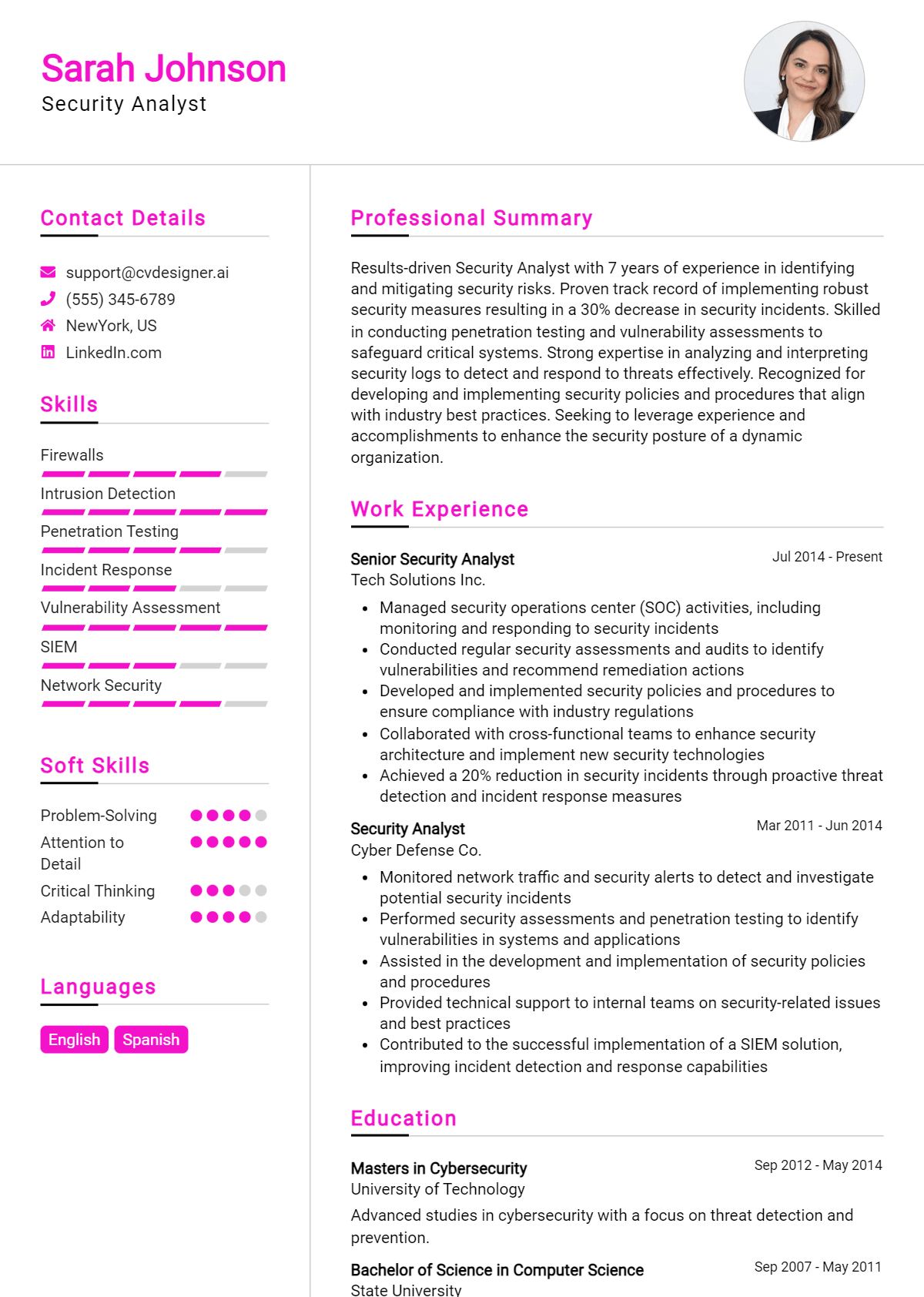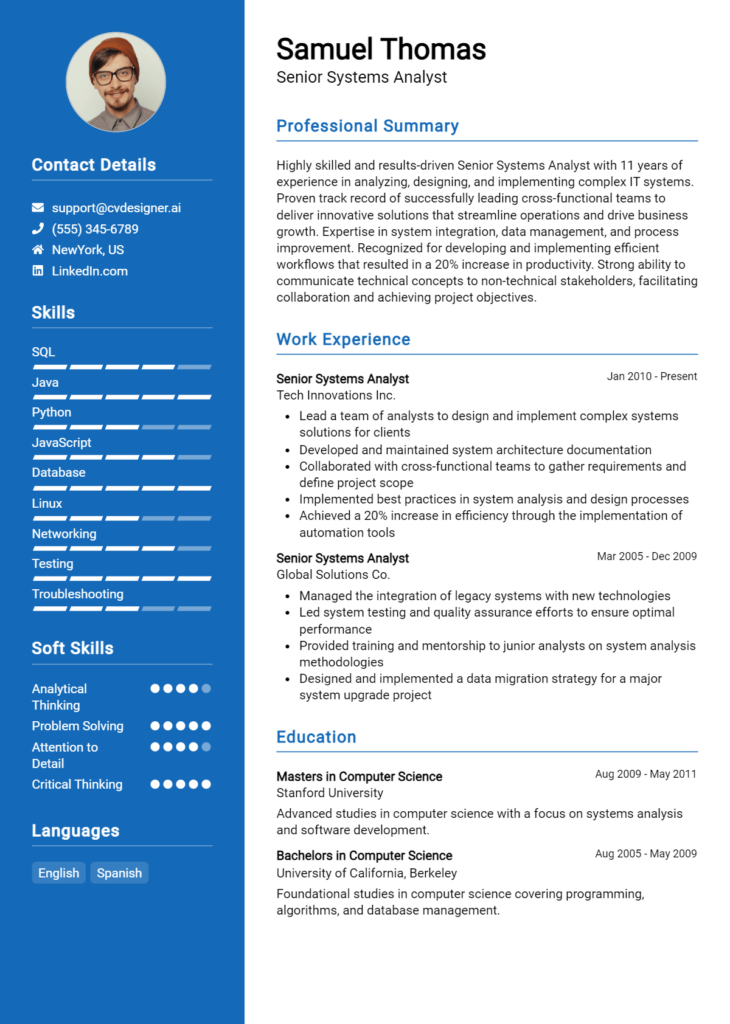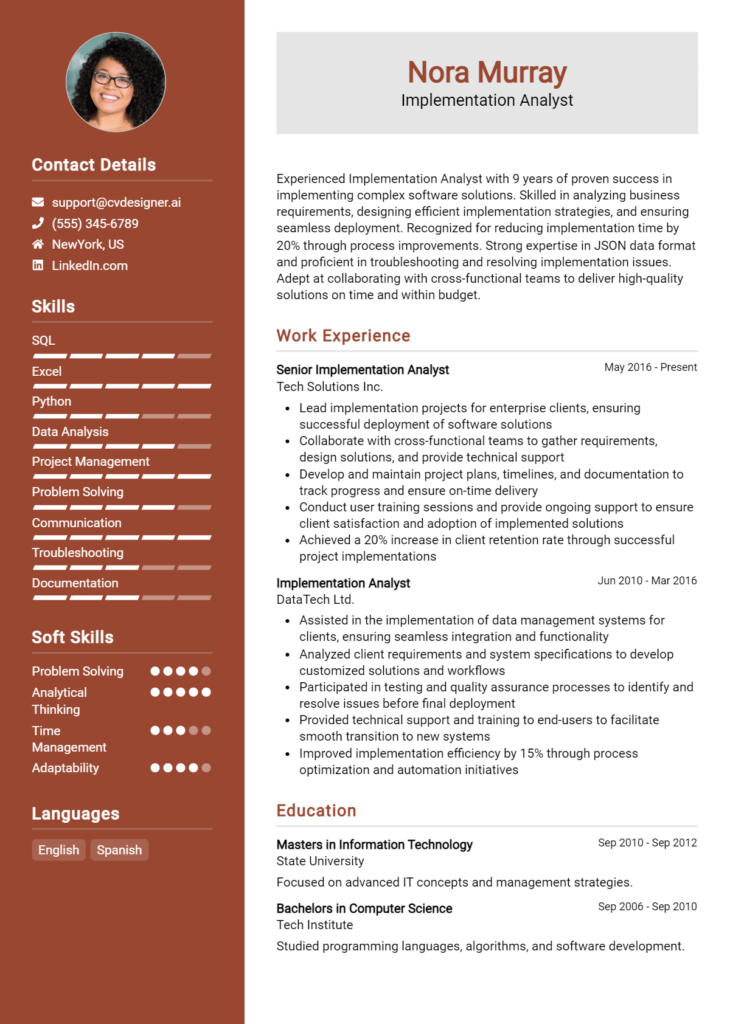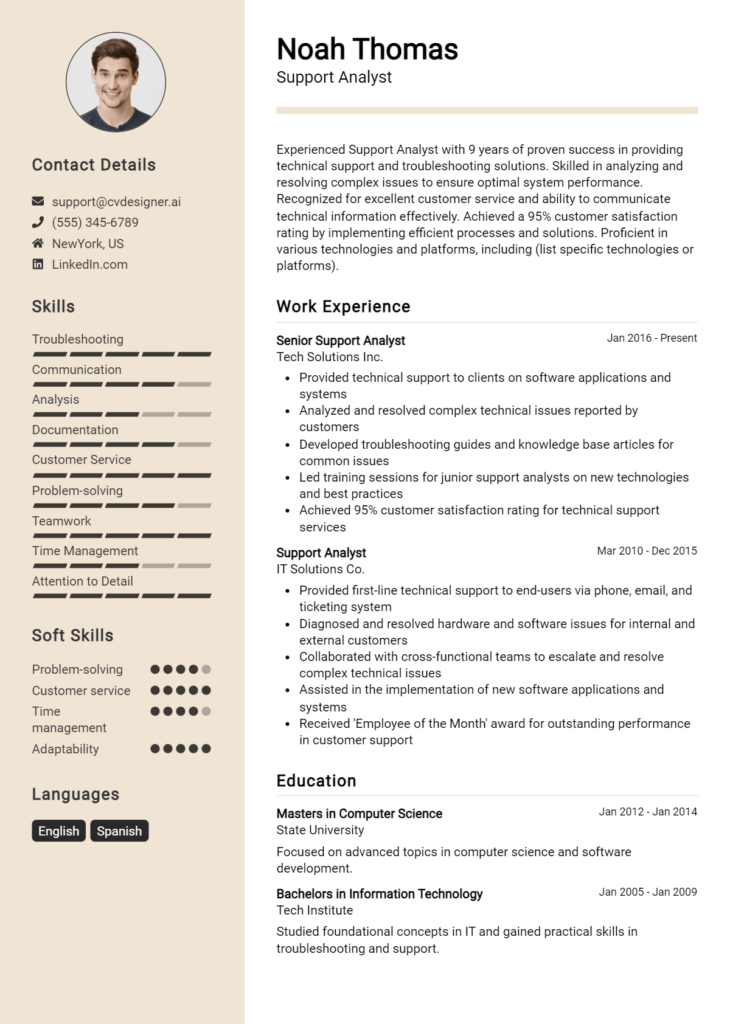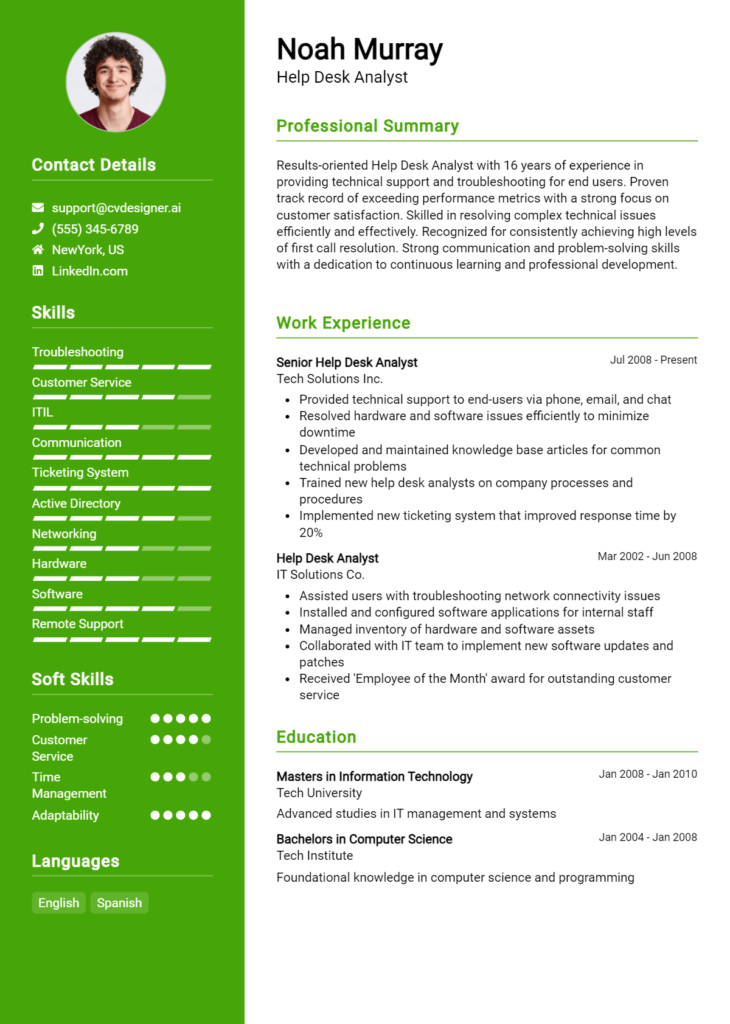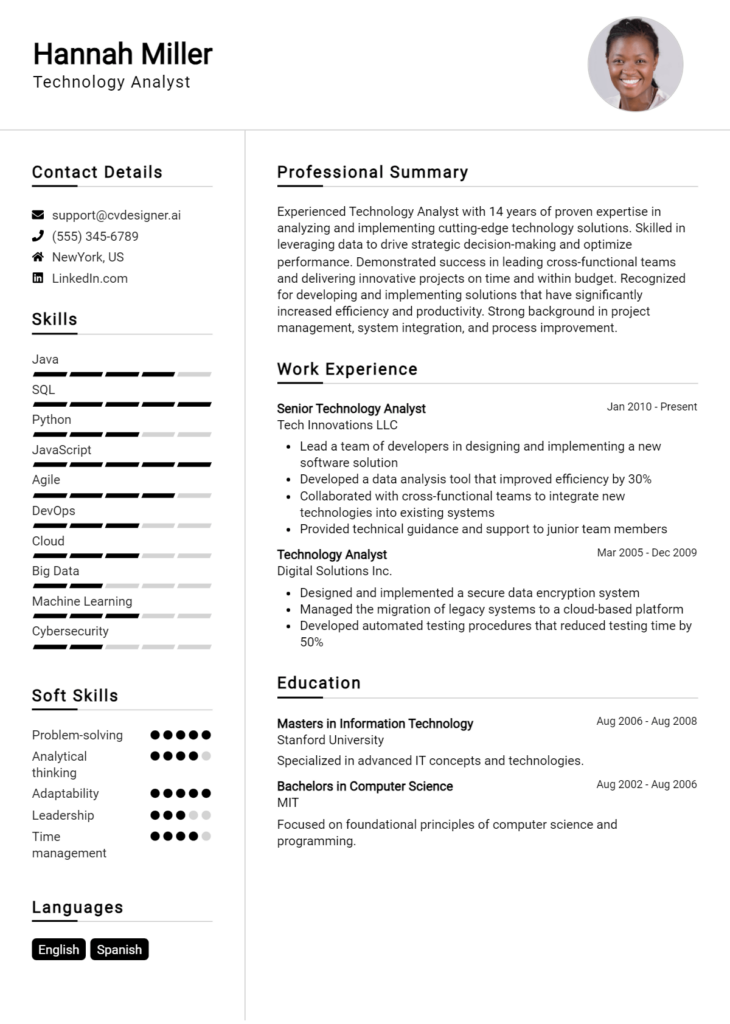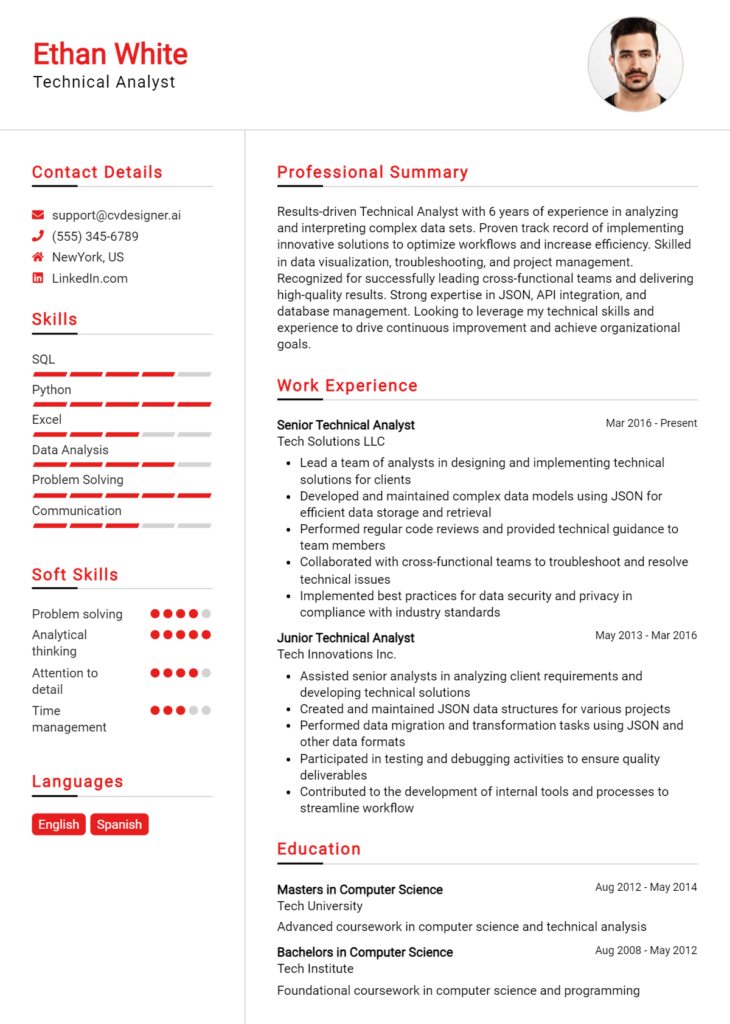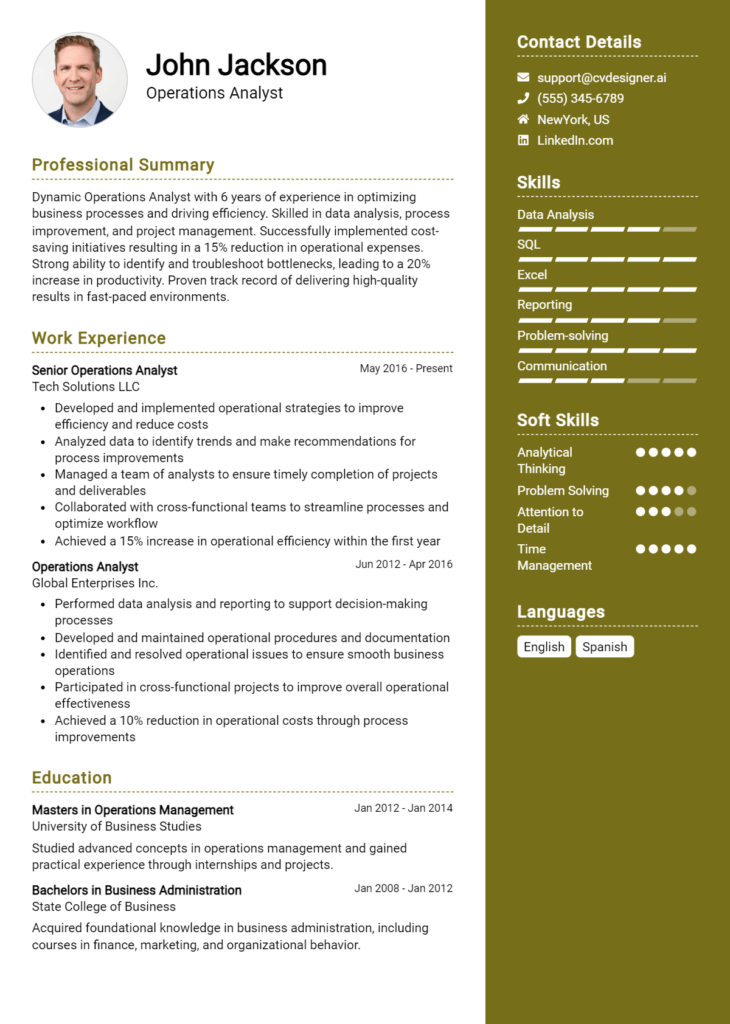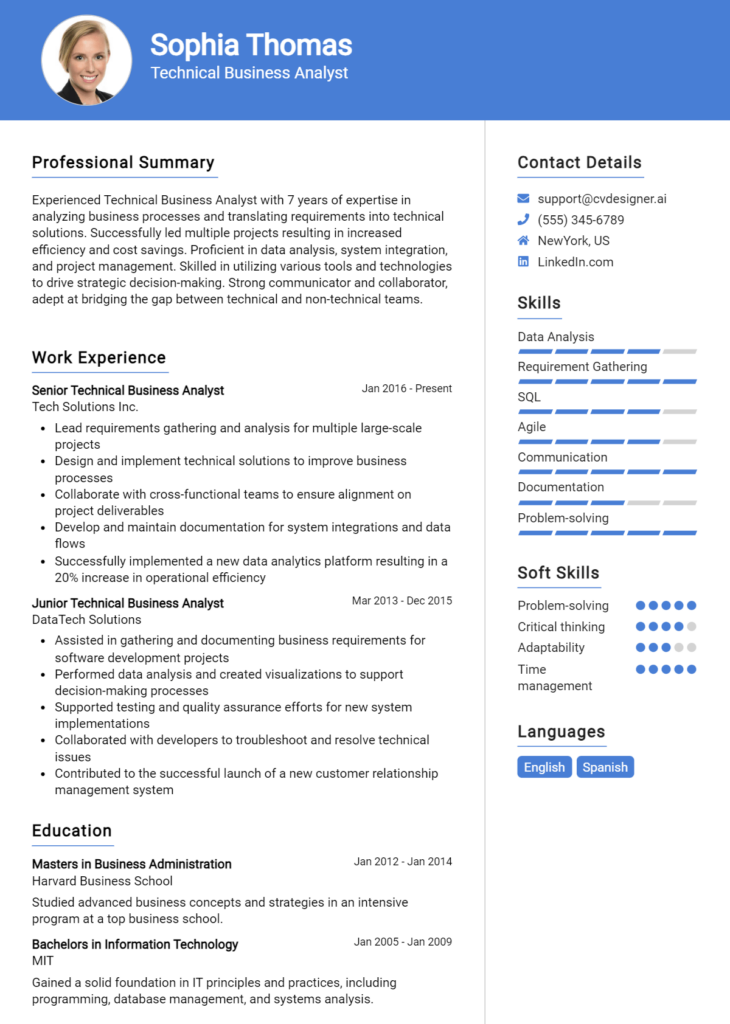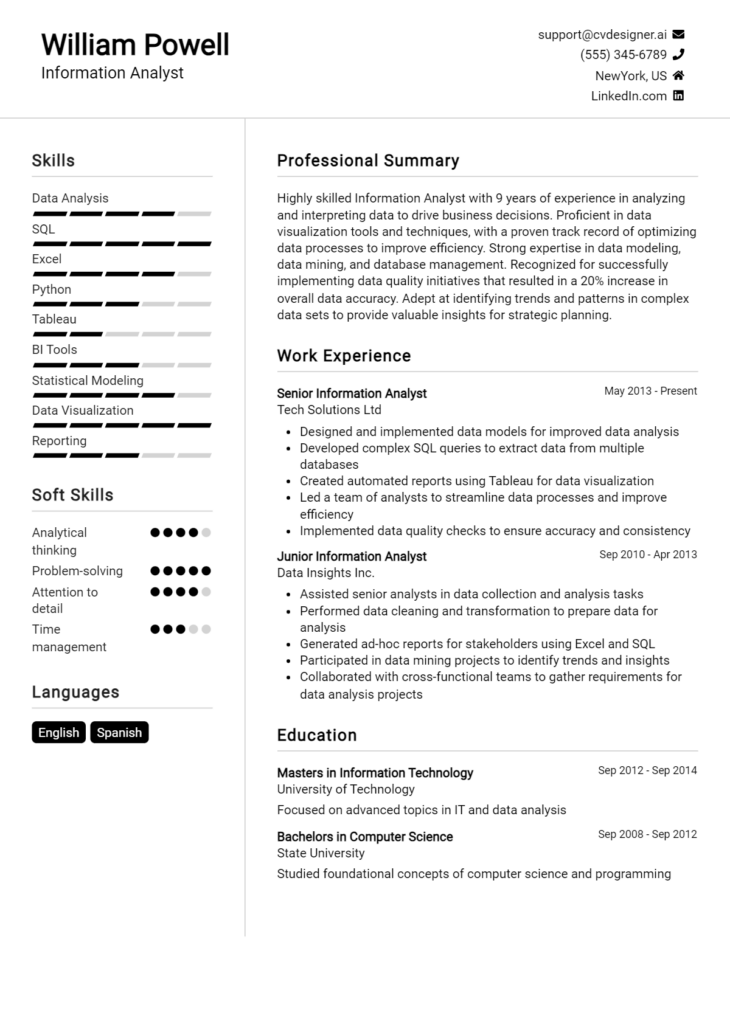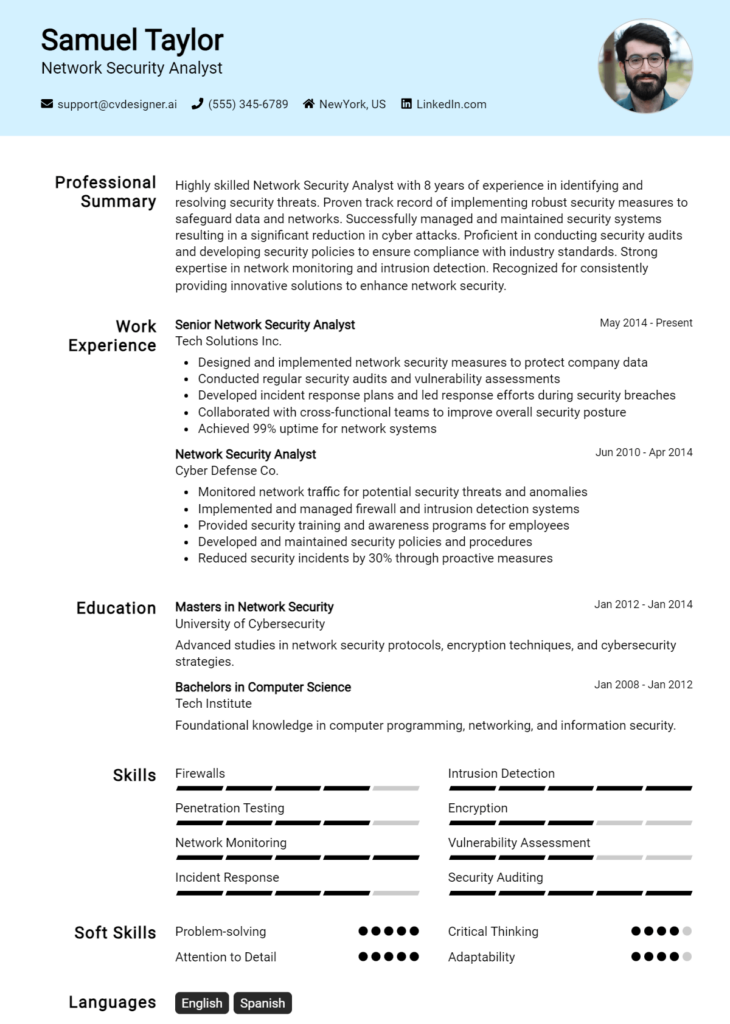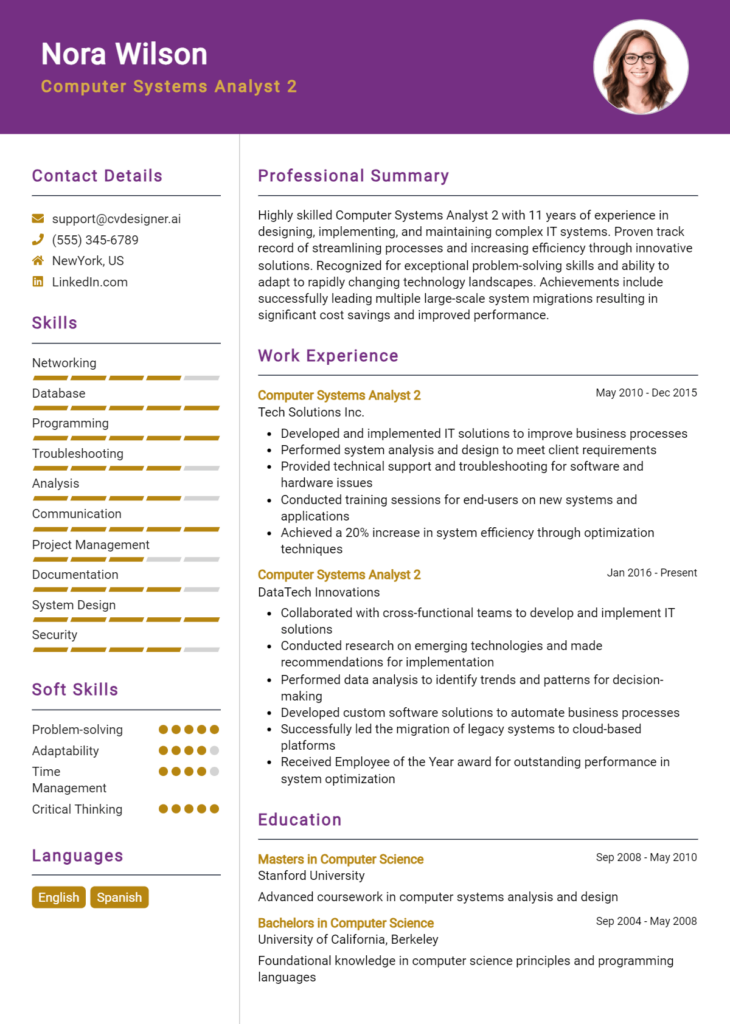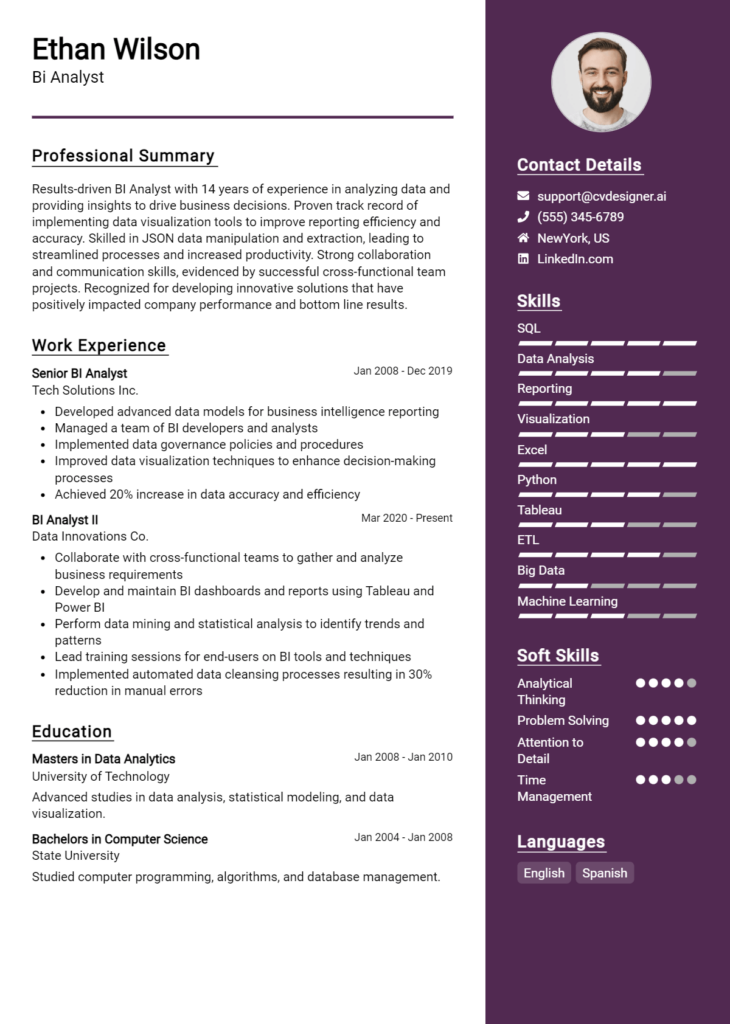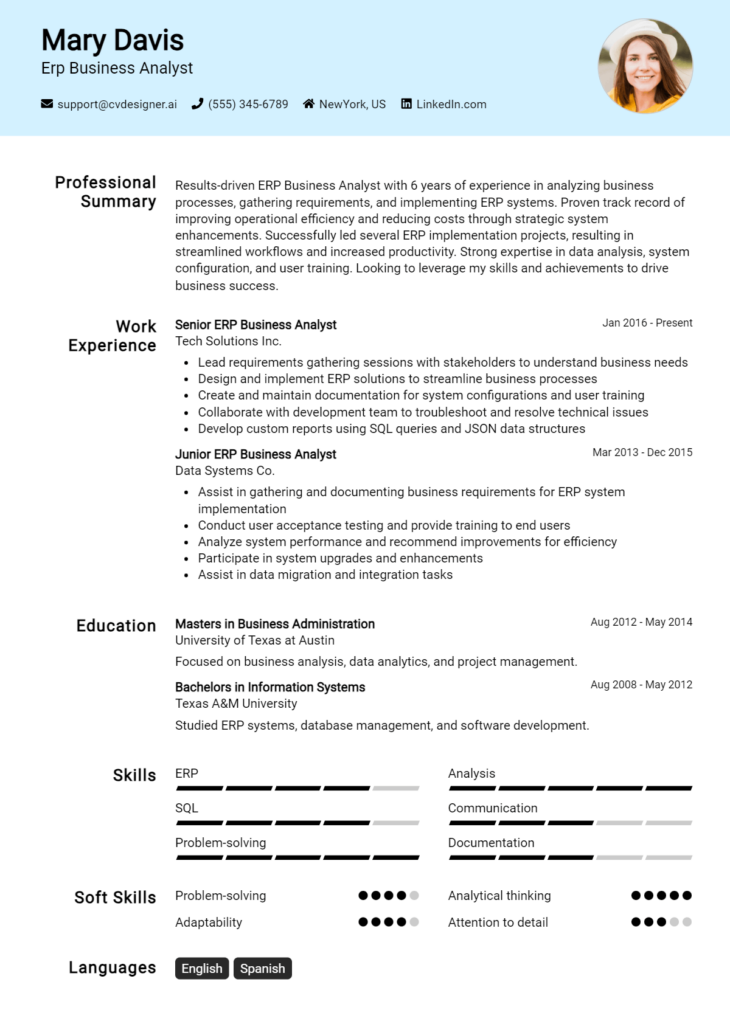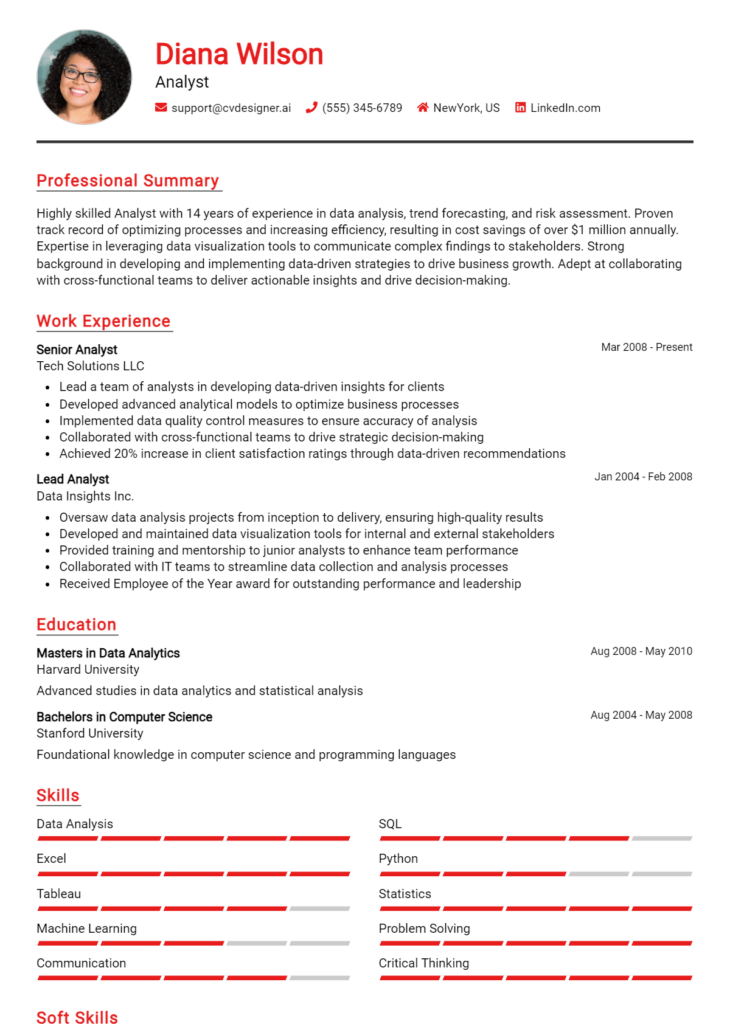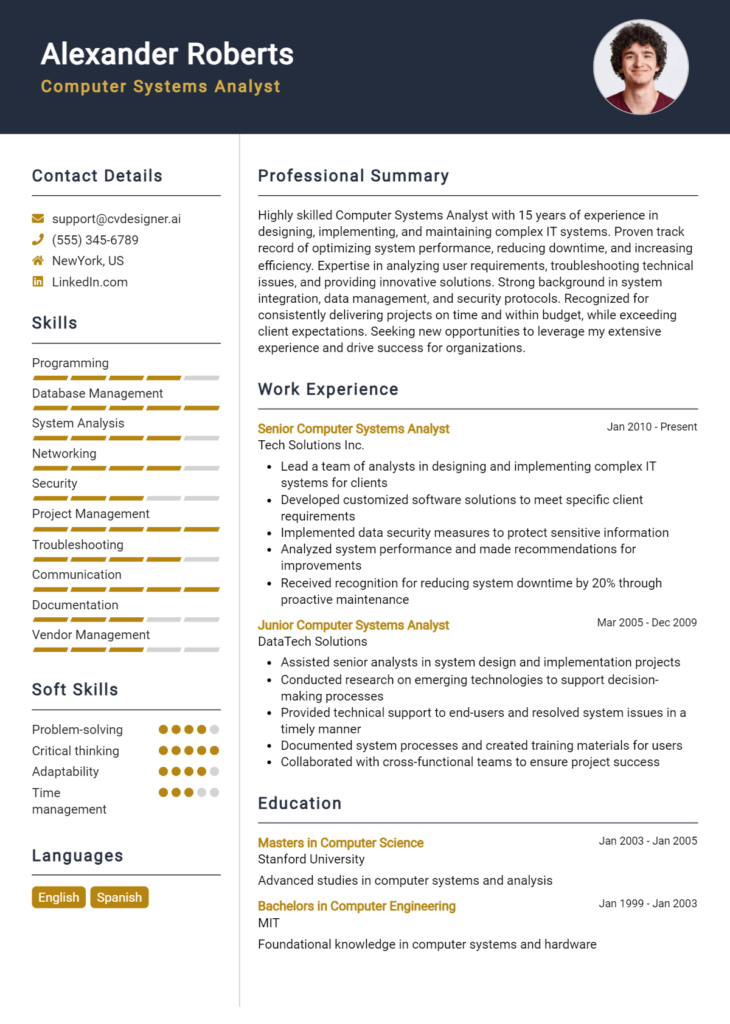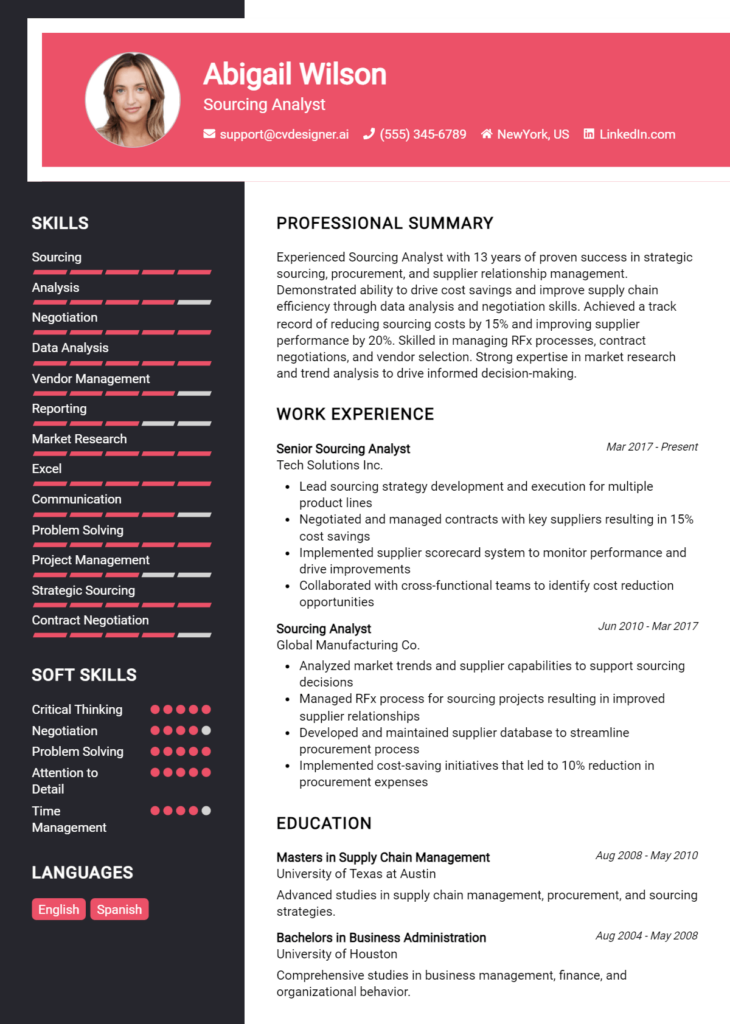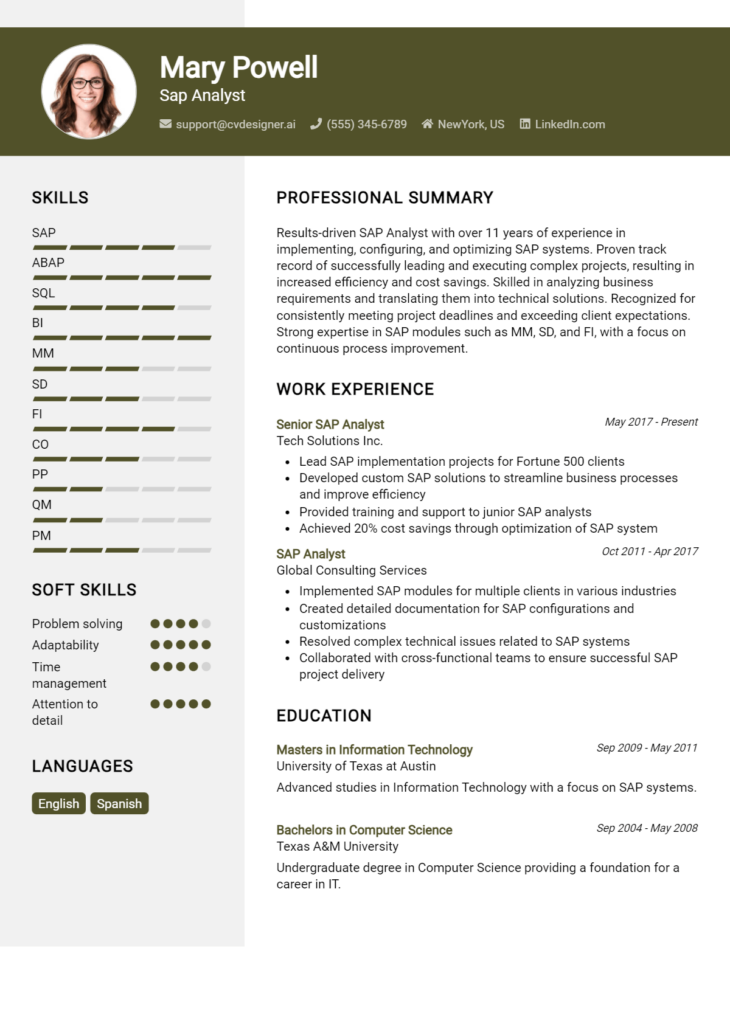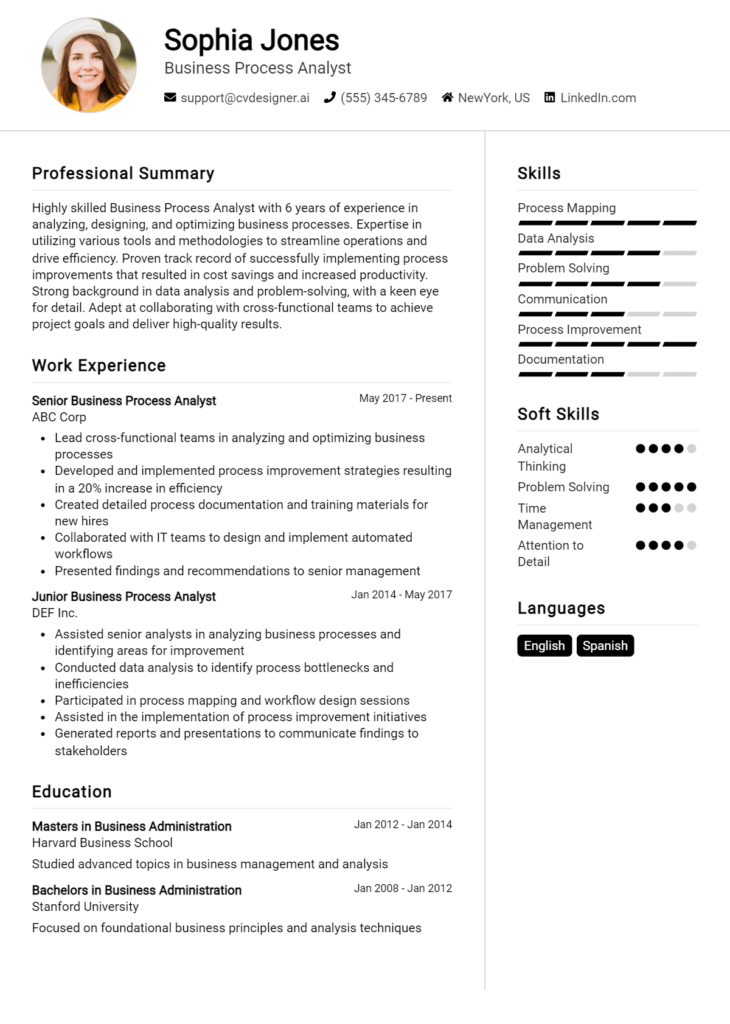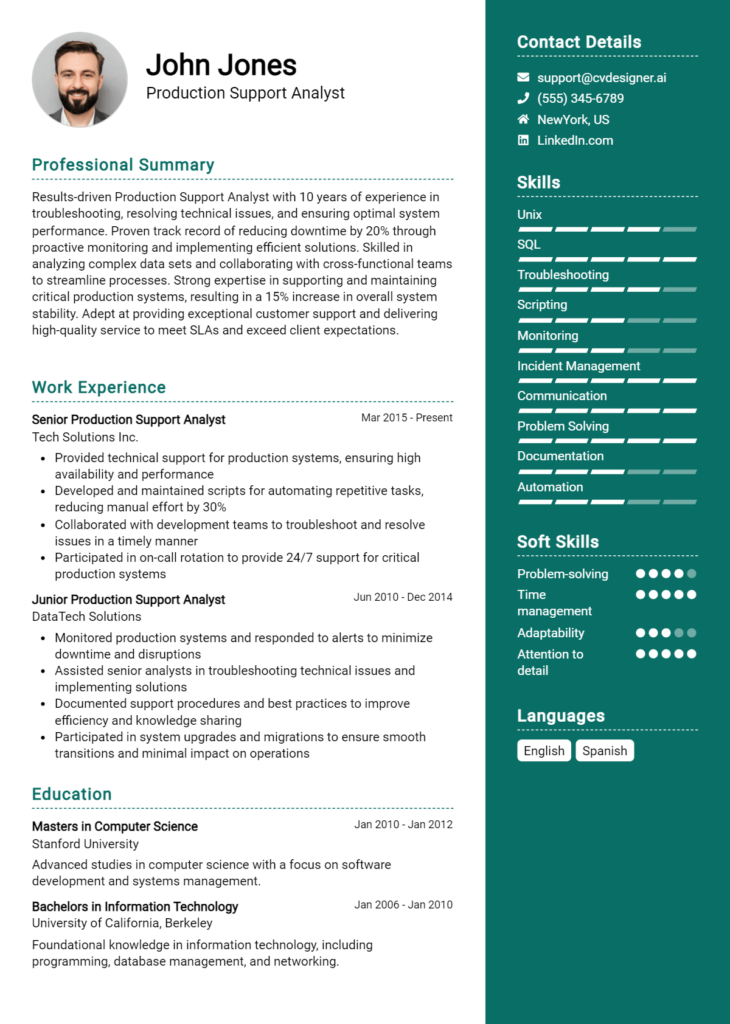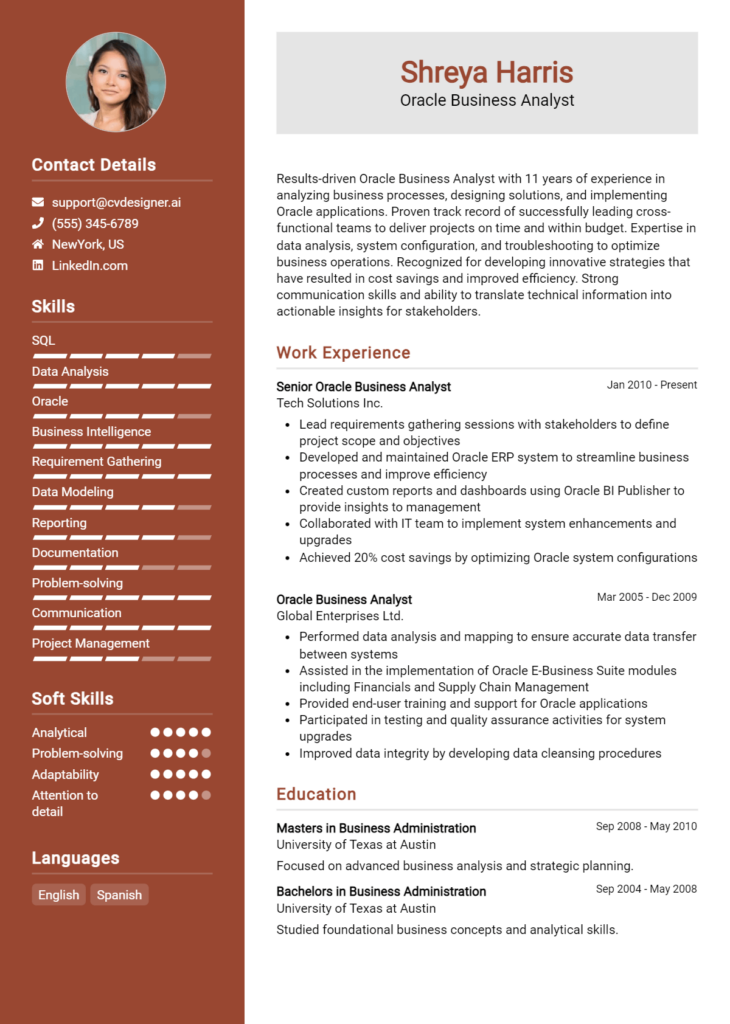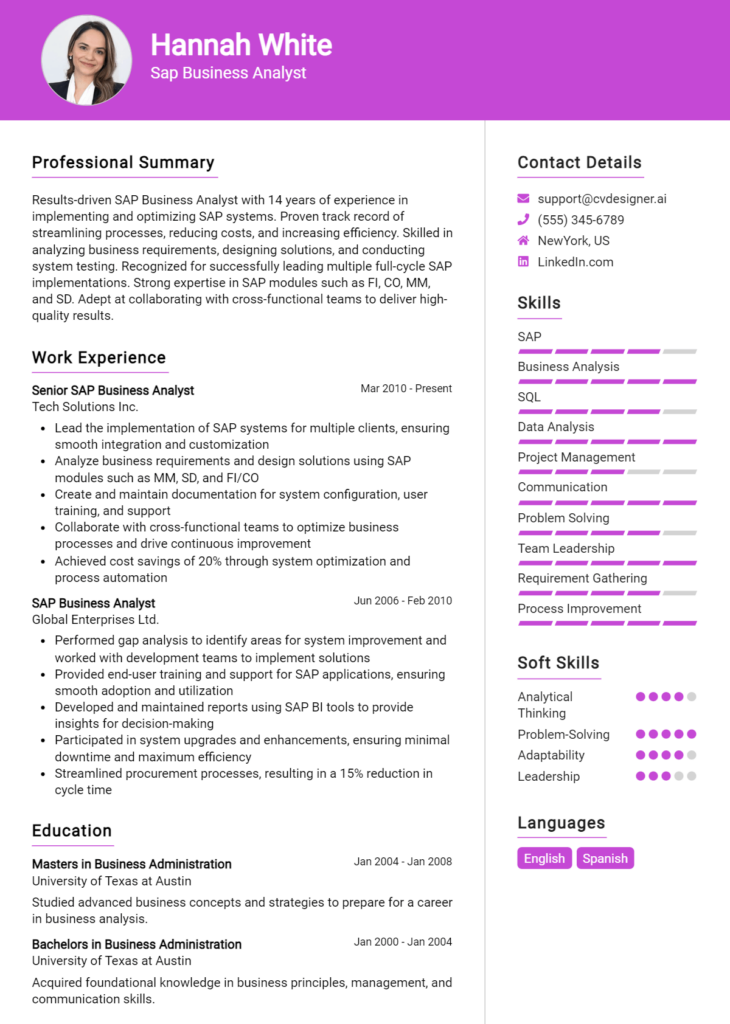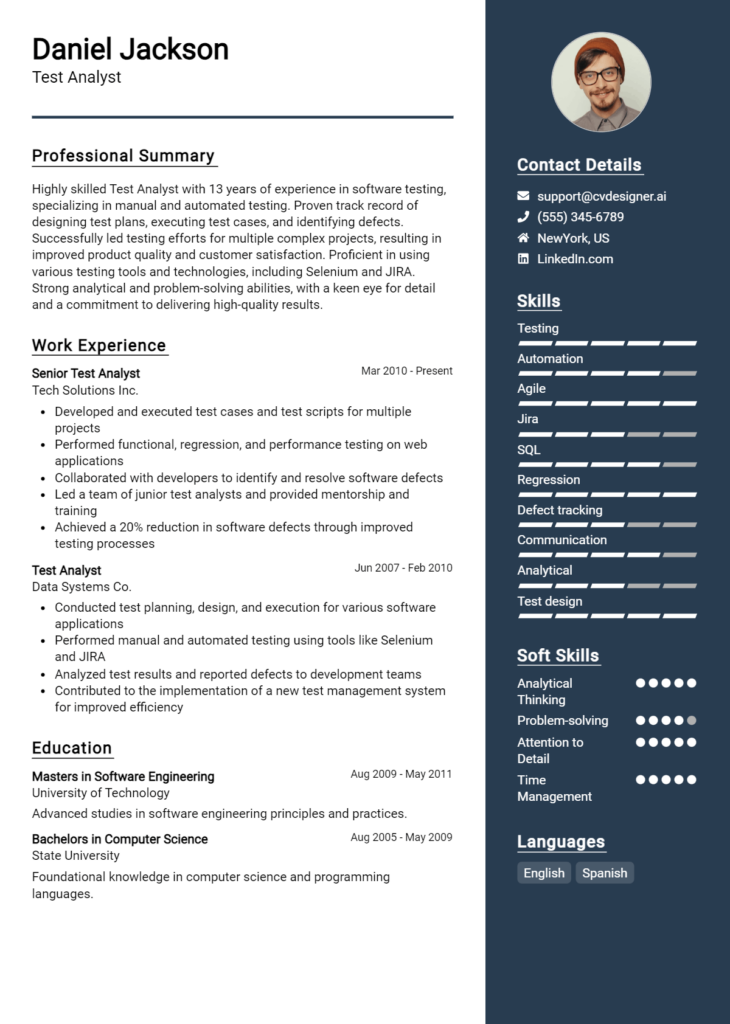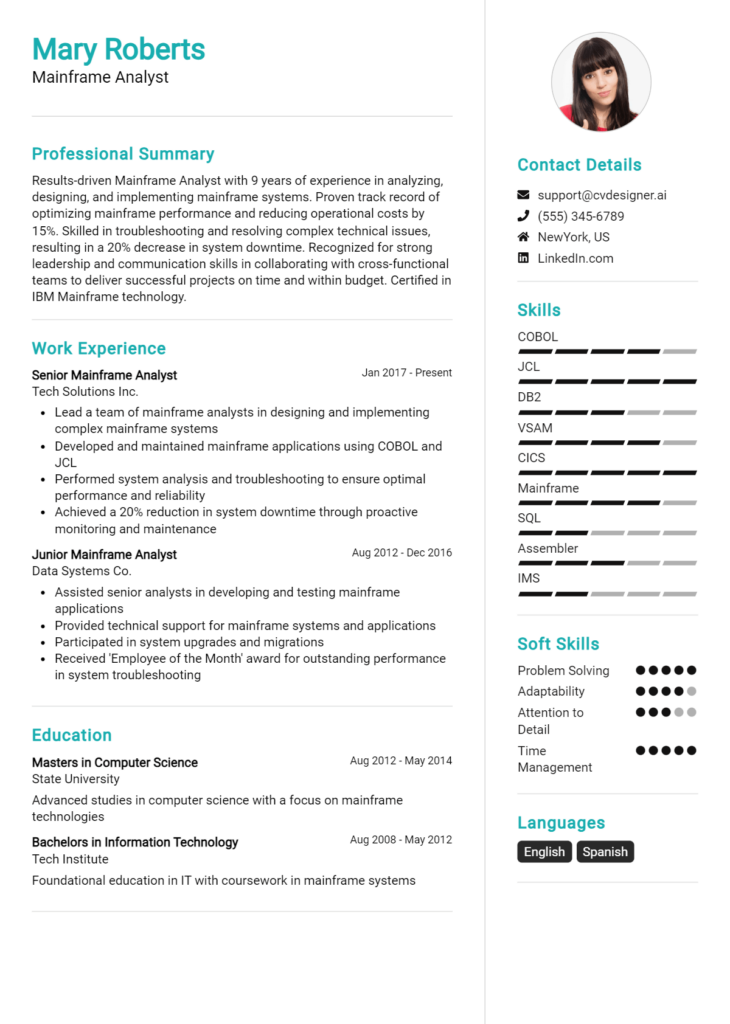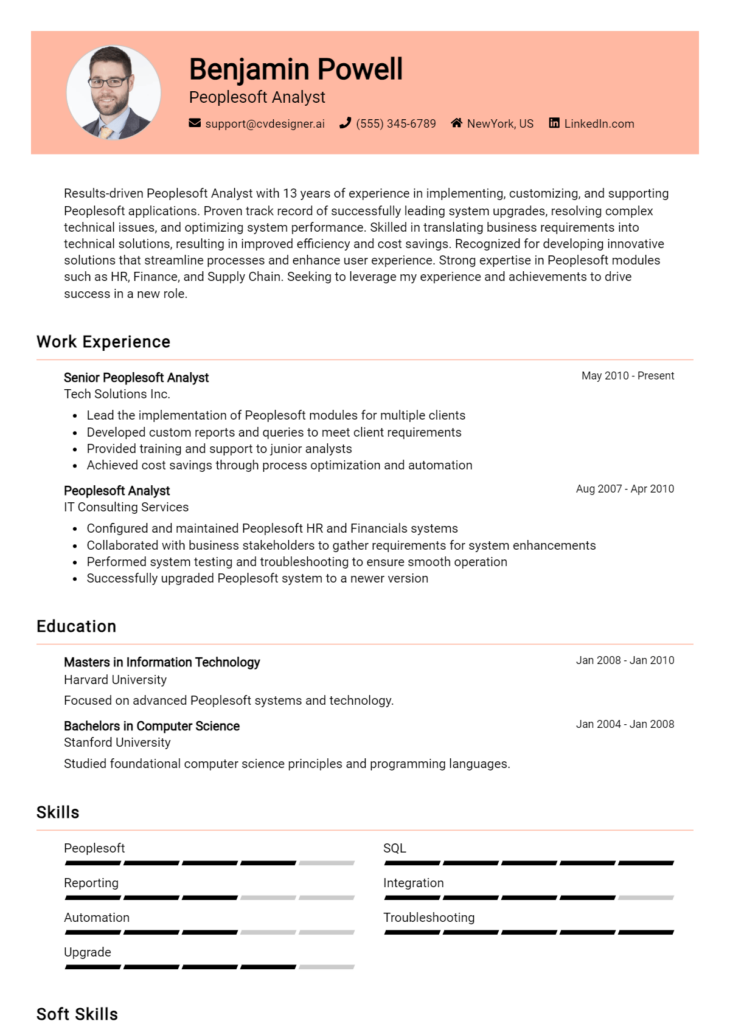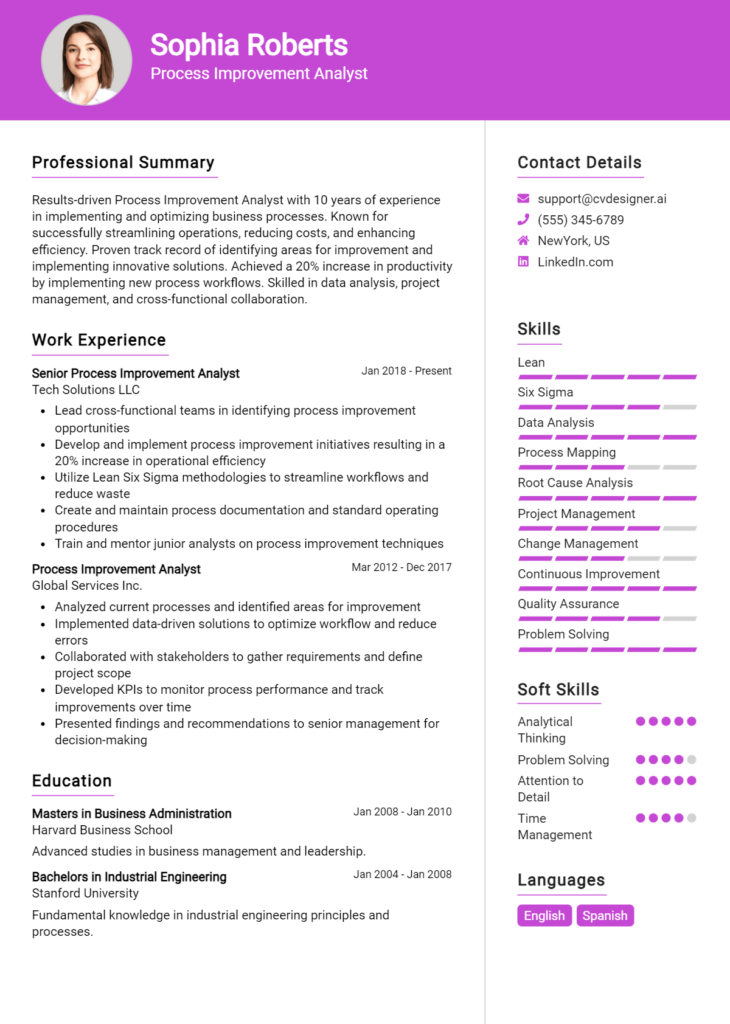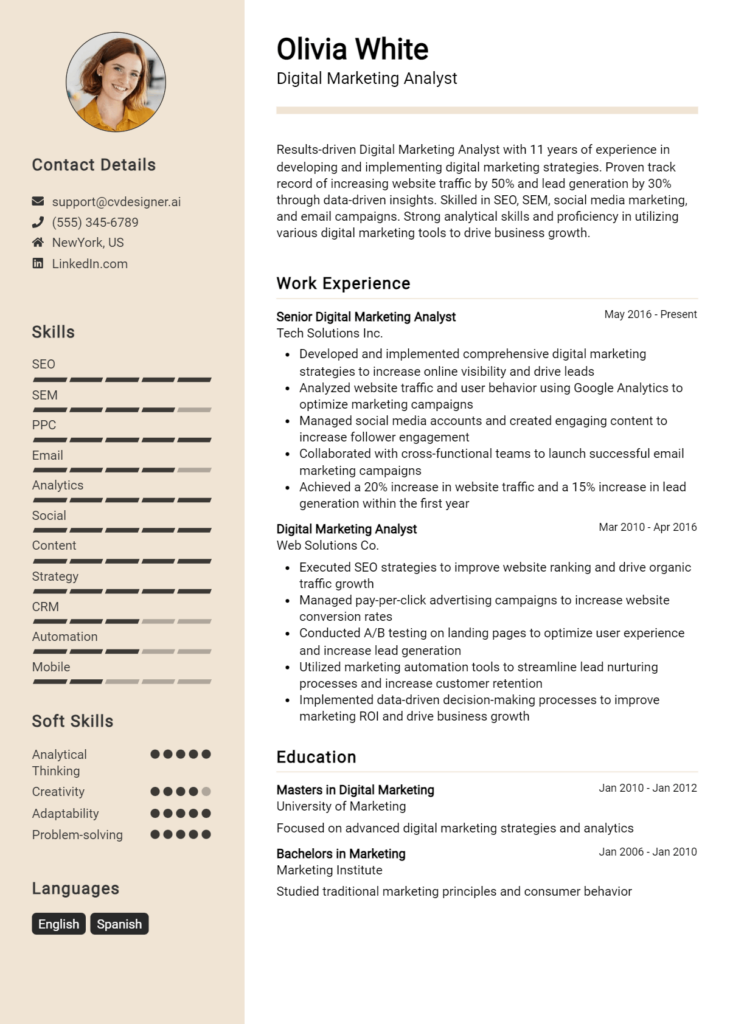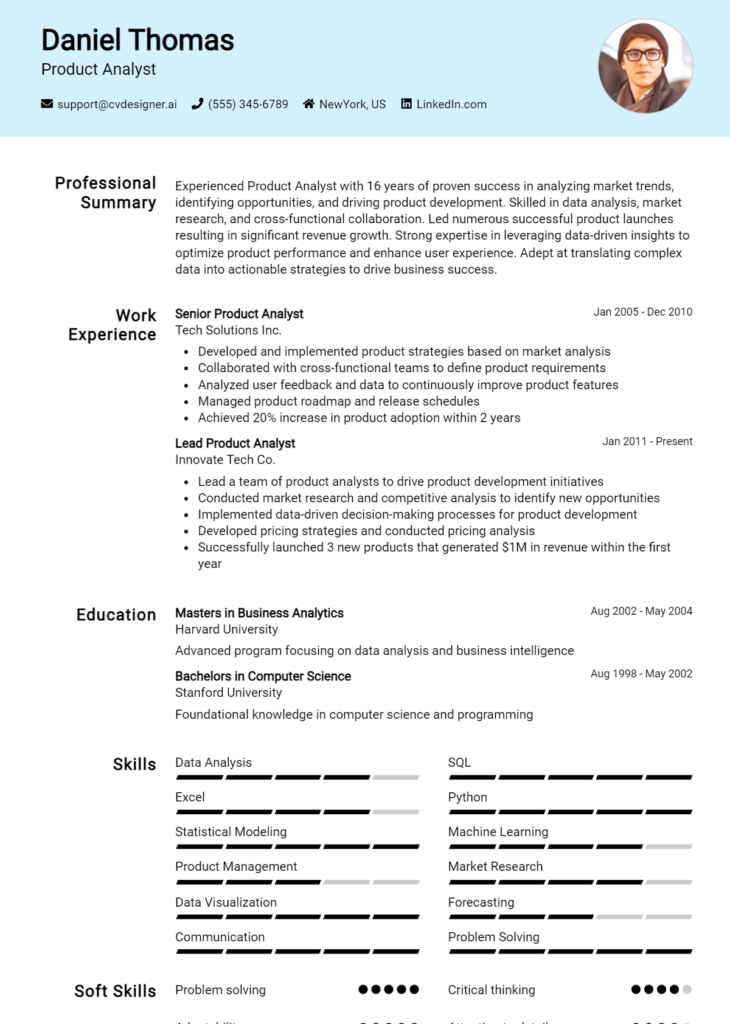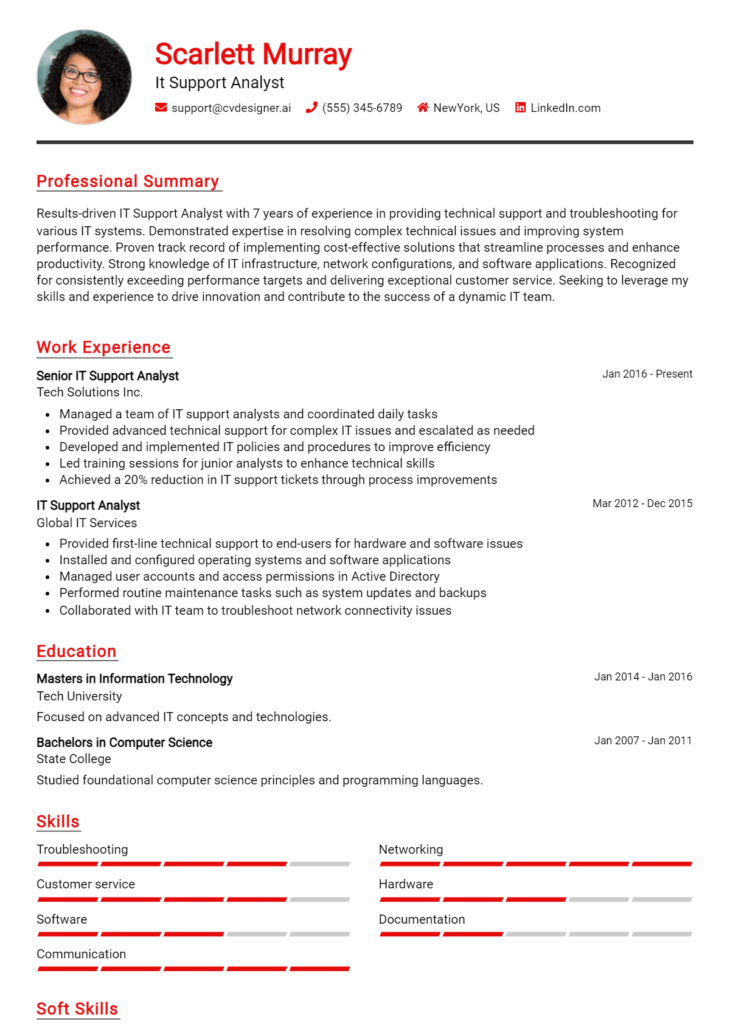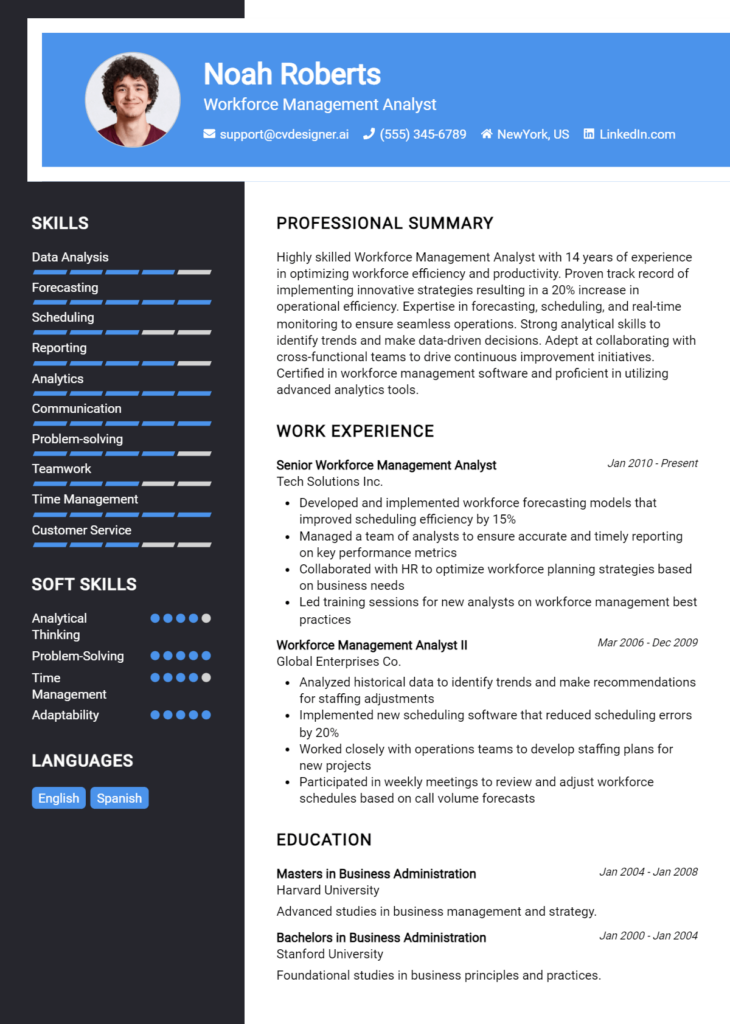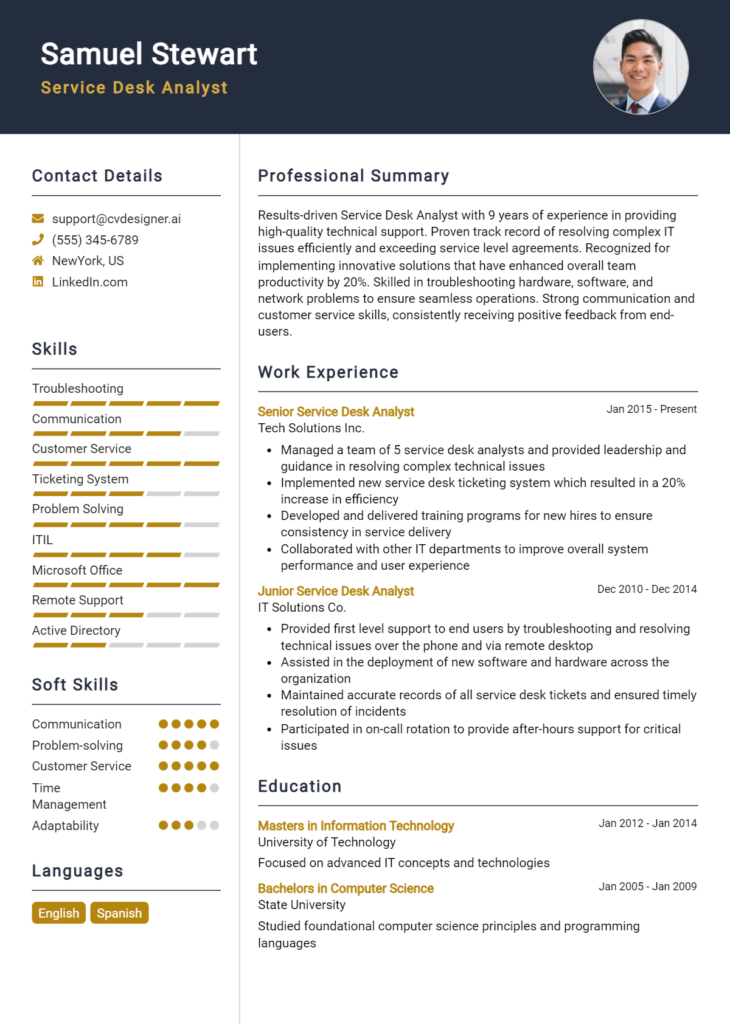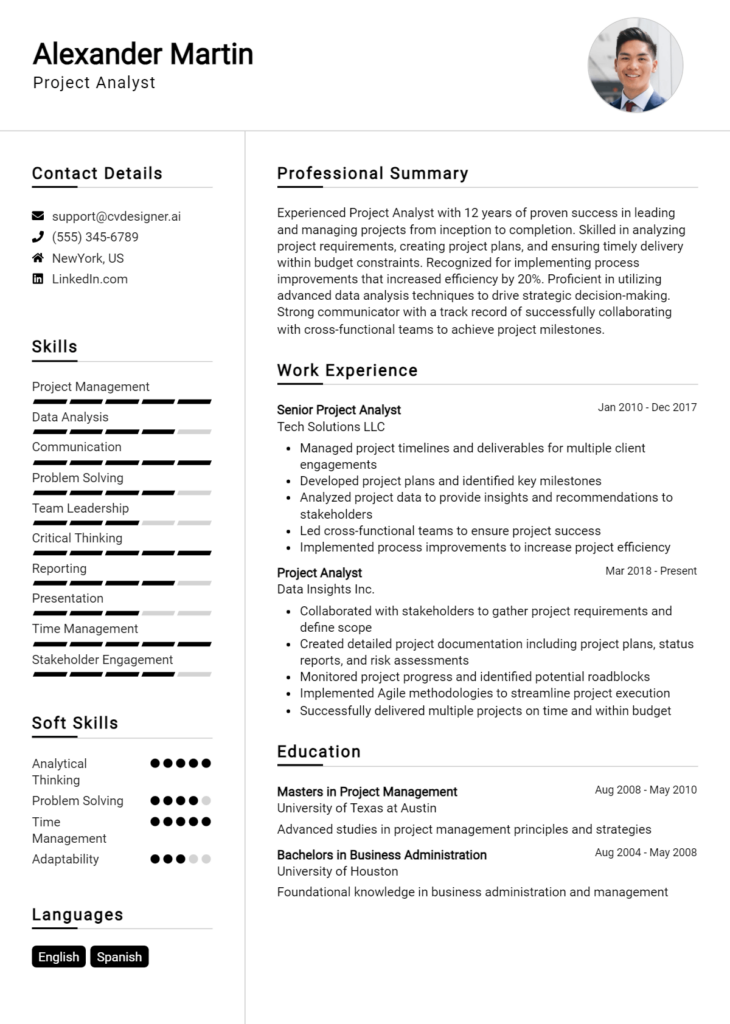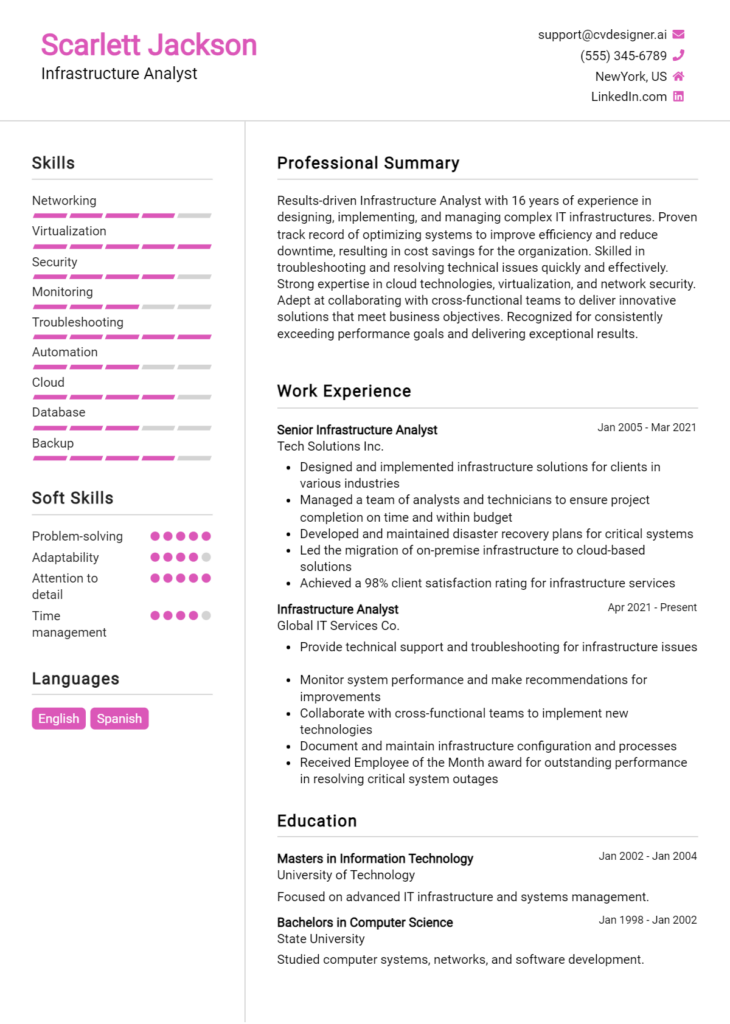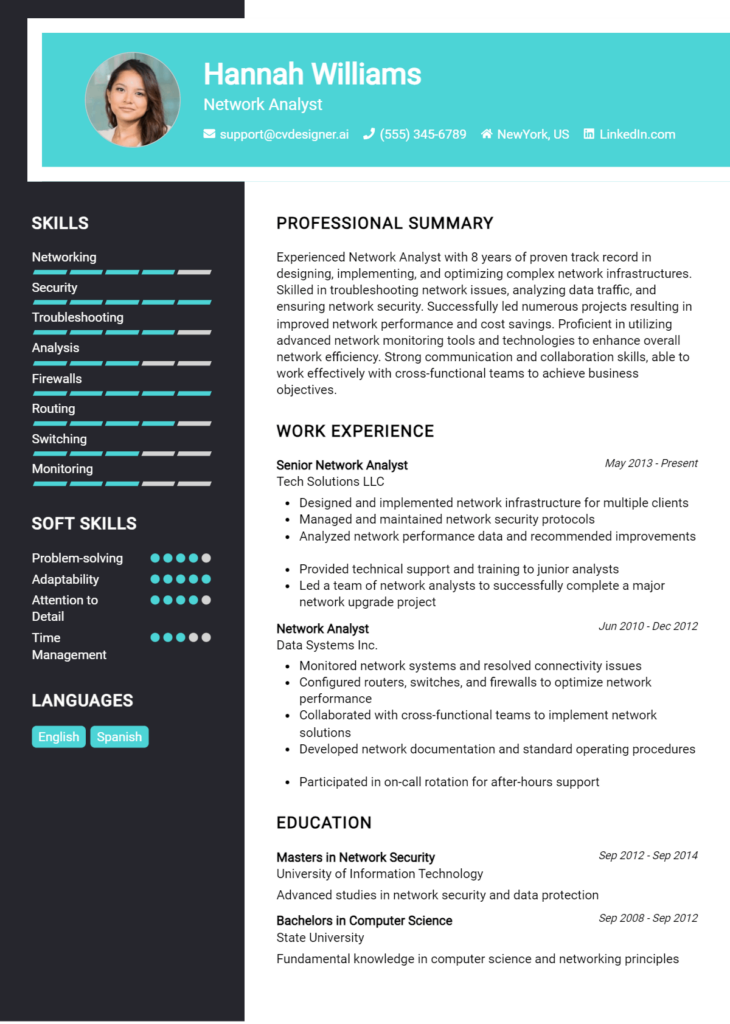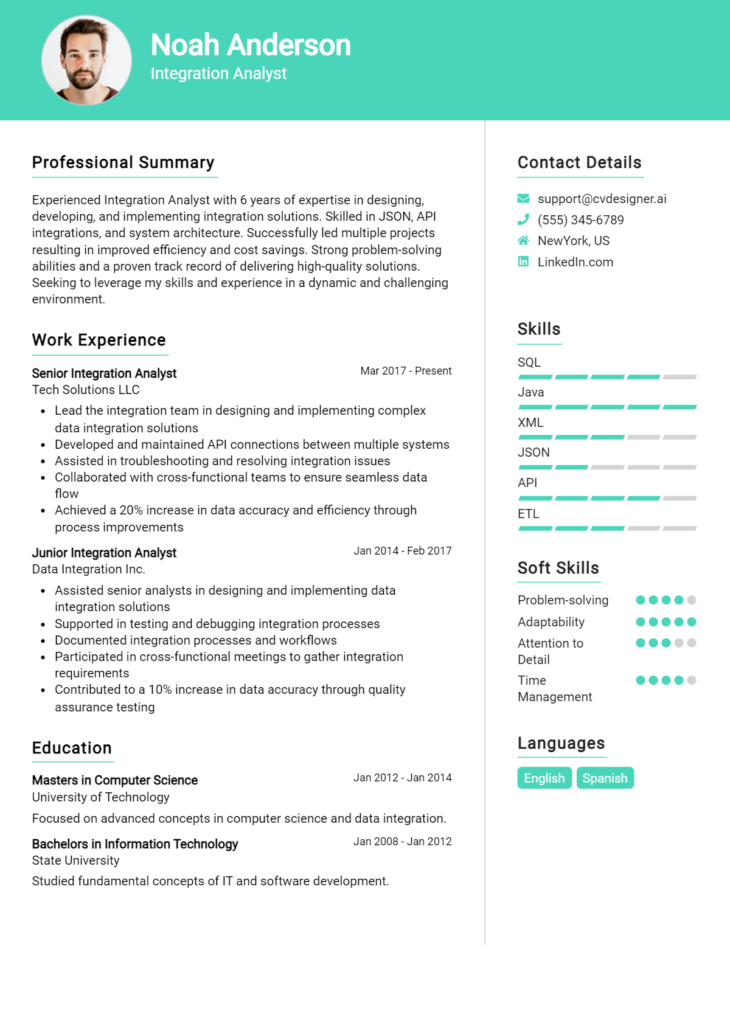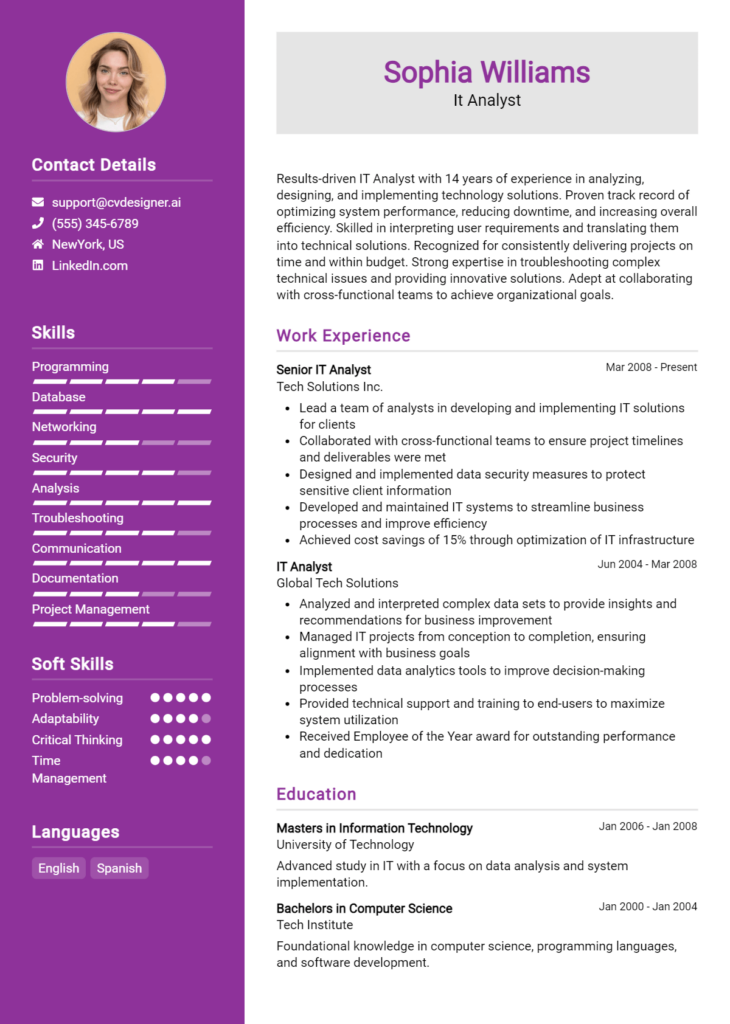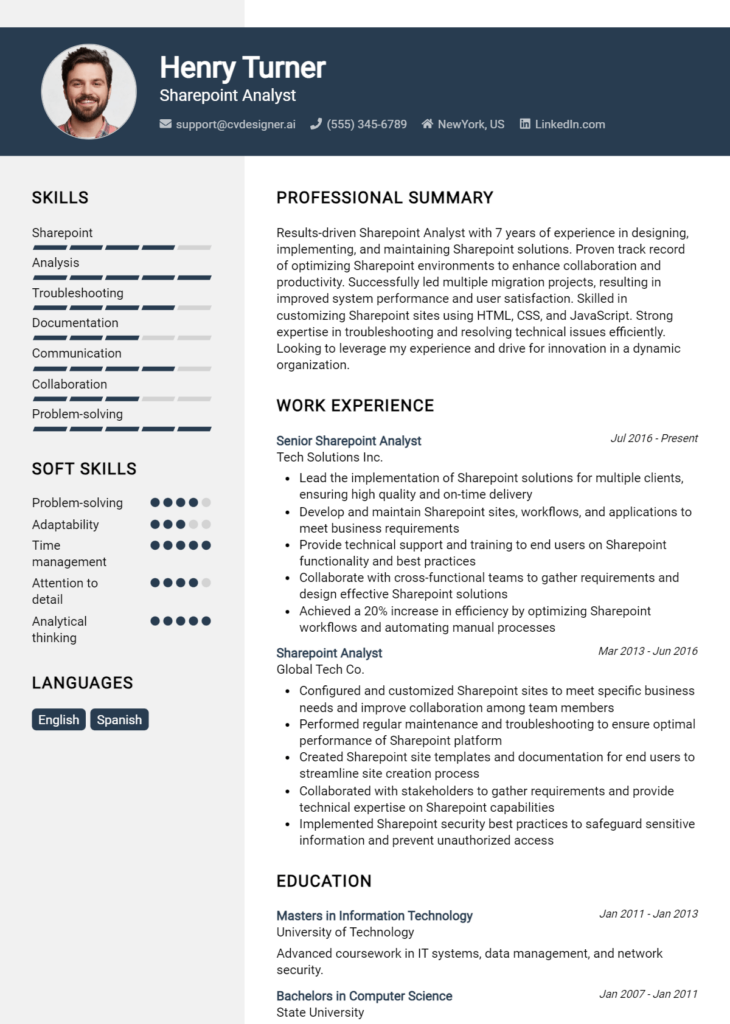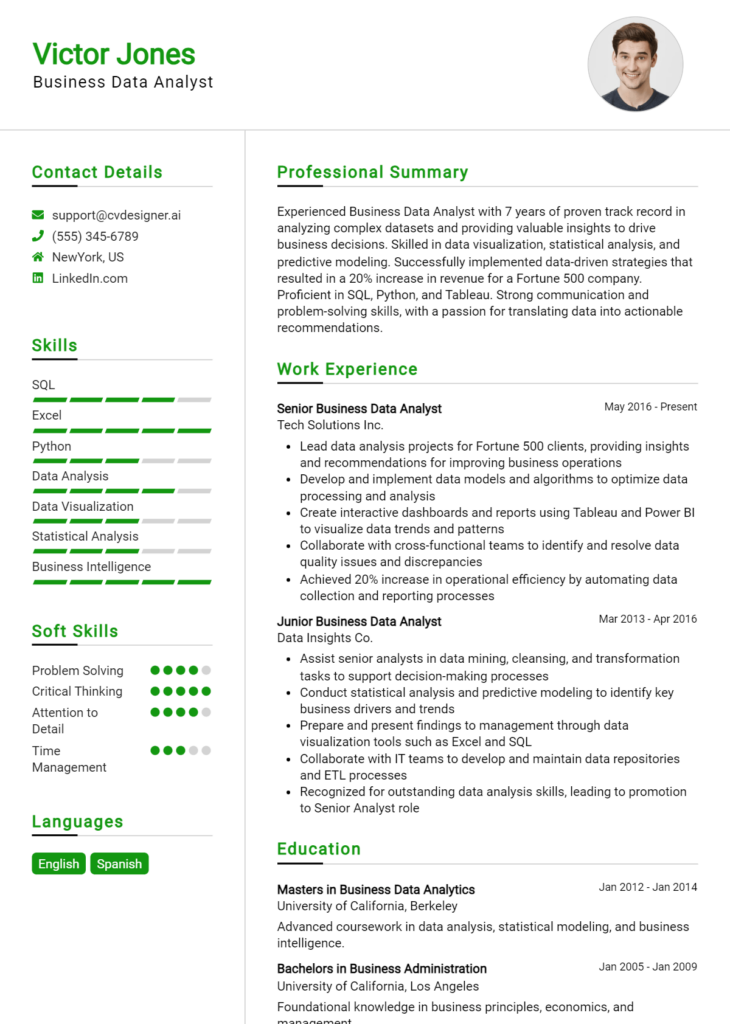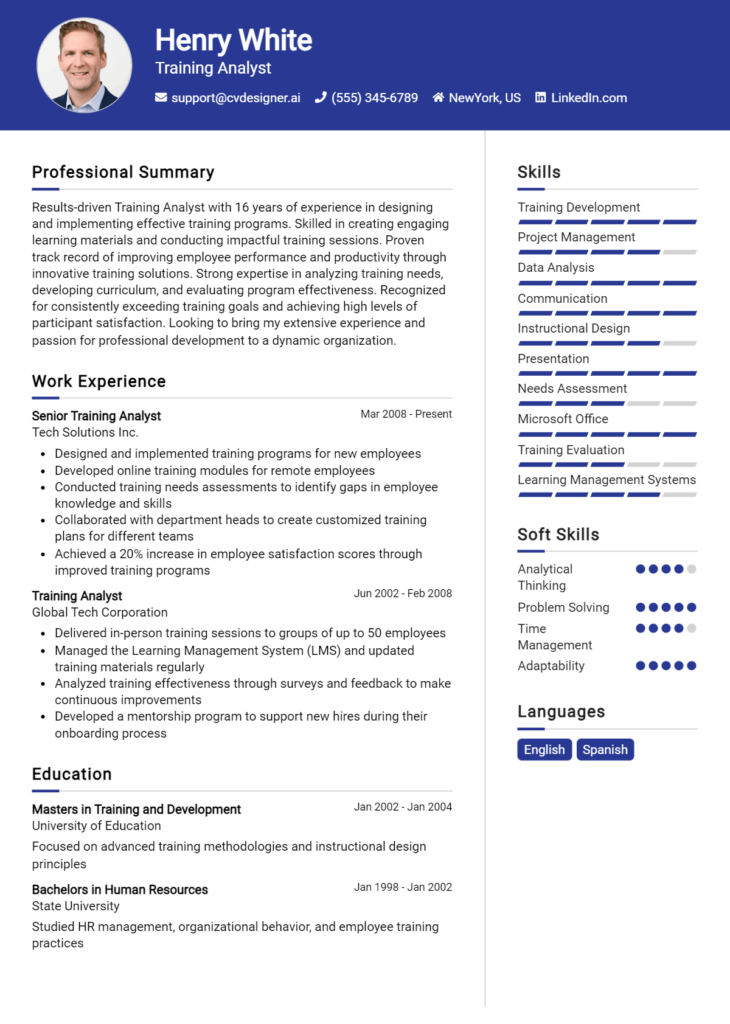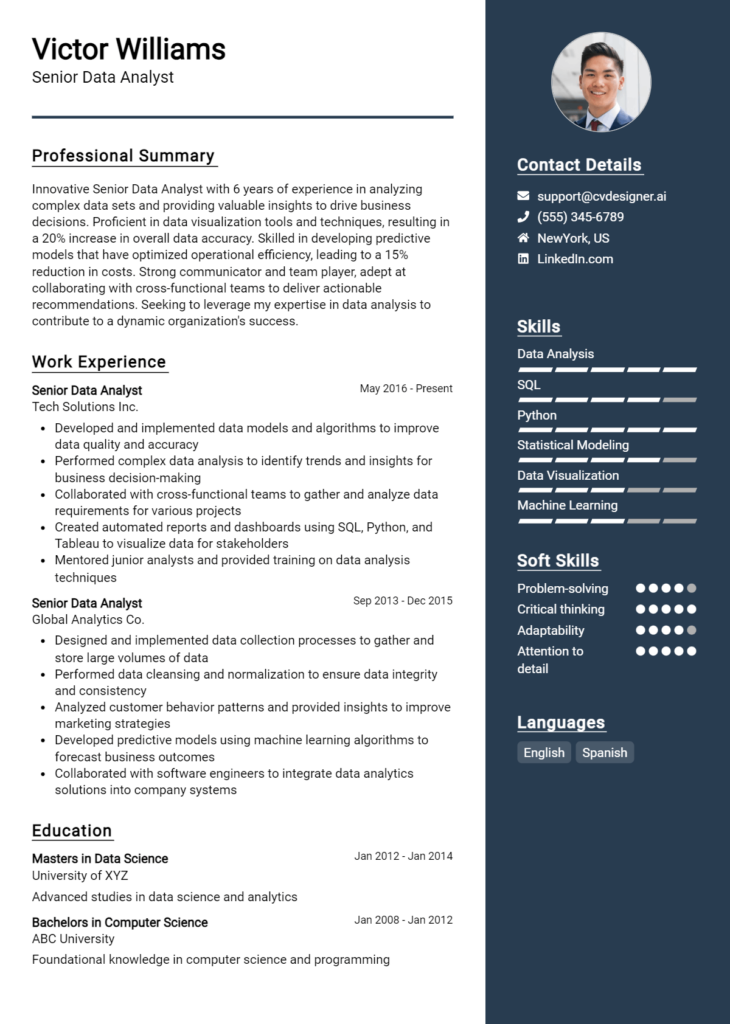Most Popular Security Analyst Resume Examples
Explore additional Security Analyst resume samples and guides and see what works for your level of experience or role.
In today's digital age, the role of a Security Analyst has never been more crucial. As organizations face an increasing number of cyber threats, these professionals are on the front lines, safeguarding sensitive information and ensuring operational integrity. A well-crafted resume is your first line of defense in securing a position in this competitive field. It not only showcases your skills and experiences but also highlights your understanding of the importance of cybersecurity. Investing time in creating a compelling resume can significantly enhance your chances of landing an interview and ultimately, the job you desire.
In this comprehensive guide to writing a Security Analyst resume, we will cover several key points to help you create an impressive document. You'll learn about the core responsibilities and skills required for this role, ensuring you highlight the most relevant aspects of your experience. We’ll discuss the best formats to utilize for maximum impact, as well as common mistakes to avoid that could undermine your application. Additionally, we’ll provide resume examples suitable for all levels of experience, from entry-level positions to seasoned professionals. To further assist you, we will share valuable tips on effective resume writing and guide you in selecting the right resume templates that align with your career goals. Whether you're starting your journey in cybersecurity or looking to advance your career, this guide is designed to equip you with the knowledge and tools necessary to stand out in the job market.
Key Responsibilities and Skills for a Security Analyst
As a Security Analyst, you play a crucial role in protecting an organization’s information systems and data from threats. Your key responsibilities typically include:
- Monitoring security systems for anomalies and potential threats.
- Conducting vulnerability assessments and risk analysis to identify weaknesses.
- Implementing and managing security measures to safeguard networks and data.
- Responding to security incidents and breaches, investigating the cause and impact.
- Developing security policies and procedures to ensure compliance with regulations.
- Collaborating with IT teams to enhance system security and user awareness.
- Staying updated on the latest cybersecurity trends and threats.
To excel in this position, several essential skills are required:
- Proficiency in security information and event management (SIEM) tools.
- Knowledge of firewalls, VPNs, IDS/IPS, and other security technologies.
- Familiarity with network protocols and architecture.
- Strong analytical and problem-solving skills.
- Excellent attention to detail and a proactive mindset.
- Effective communication and teamwork abilities.
- Certifications such as CISSP, CEH, or CompTIA Security+ can enhance credibility.
Highlighting these skills effectively in the resume skills section is vital. Tailoring these responsibilities and skills to the specific job description you are applying for can significantly increase your chances of being noticed by hiring managers. Consider how these skills translate into real-world applications when creating a strong CV, showcasing your qualifications and aligning them with the needs of the potential employer. This approach not only demonstrates your expertise but also your dedication to the field of cybersecurity.
Best Resume Format and Structure for a Security Analyst
When crafting a resume for a Security Analyst position, it is essential to choose a format that presents your qualifications clearly and professionally. A chronological or combination resume format typically works best as it allows you to highlight your work experience and skills effectively. Below is a detailed guide on the key sections to include, along with tips for each section.
Contact Information
- Your name should be at the top, prominently displayed.
- Include your phone number, email address, and LinkedIn profile (if applicable).
- Consider adding your city and state, but avoid including your full address for privacy reasons.
Professional Summary
- Write a brief, compelling summary (2-4 sentences) that highlights your experience and key skills as a Security Analyst.
- Tailor this section to the job description, emphasizing relevant achievements and qualifications.
- Use keywords related to the security domain to pass through Applicant Tracking Systems (ATS).
Work Experience
- List your work experience in reverse chronological order, starting with your most recent job.
- For each position, include the job title, company name, location, and the dates you worked there.
- Use bullet points to describe your responsibilities and achievements, focusing on quantifiable results (e.g., "Reduced security breaches by 30% through proactive monitoring and incident response").
- Highlight specific tools and technologies you’re proficient in, such as SIEM systems, firewalls, or intrusion detection systems.
Education
- List your highest degree first, including the degree obtained, major, institution name, and graduation date.
- If you have relevant coursework or projects, consider including them to showcase specialized knowledge.
- If you have certifications (discussed in the next section), you can place this section after education.
Skills
- Create a bullet-point list of relevant technical and soft skills.
- Include skills such as risk assessment, vulnerability scanning, incident response, and knowledge of compliance standards (e.g., GDPR, HIPAA).
- Mention programming or scripting languages if applicable (e.g., Python, Bash).
- Soft skills like analytical thinking, attention to detail, and communication should also be included.
Certifications
- List any professional certifications relevant to cybersecurity, such as CISSP, CEH, CompTIA Security+, or CISM.
- Include the certification name, the issuing organization, and the date obtained or expiration date if applicable.
- This section can also highlight ongoing education or training relevant to security best practices.
Formatting Tips
- Use a clean, professional font (e.g., Arial, Calibri, or Times New Roman) and keep the font size between 10-12 points for readability.
- Maintain consistent formatting for headings, bullet points, and spacing throughout the document.
- Limit your resume to one page if you have less than 10 years of experience; two pages are acceptable for more extensive career histories.
- Utilize white space to prevent clutter and make it easy to skim.
Complementing the Resume with a Cover Letter The format of your resume can complement your cover letter by maintaining a similar visual style. Use the same font, color scheme, and header layout for both documents. In your cover letter, expand on your qualifications and experiences listed in the resume, providing context and demonstrating your enthusiasm for the role. Tailor the cover letter to the specific job, mentioning how your skills directly align with the company’s needs and goals.
By following this structured approach, you can create an impactful resume that effectively showcases your qualifications as a Security Analyst, increasing your chances of landing an interview.
Writing Tips and Best Practices for a Security Analyst Resume
When crafting a resume as a Security Analyst, it’s essential to create a clear, concise document that highlights your technical expertise and relevant experience. Tailor your resume to the specific job description, using industry-specific keywords to demonstrate your familiarity with the field. Make sure to present your achievements with quantifiable metrics where possible, as this demonstrates the impact of your work. Utilize action verbs to convey your contributions effectively, ensuring that your resume stands out to hiring managers. Remember that a polished and professional appearance is crucial, so consider utilizing resume writing tips for guidance. Additionally, these practices are equally important when drafting a cover letter, so keep them in mind.
- Use action verbs like "analyzed," "implemented," "monitored," and "developed" to start your bullet points.
- Quantify your achievements with metrics, such as "reduced security incidents by 30%" or "improved response time by 50%."
- Incorporate industry-specific keywords, such as "intrusion detection," "malware analysis," and "risk assessment," to get past Applicant Tracking Systems (ATS).
- Keep your resume to one or two pages, focusing on your most relevant experiences and skills.
- Use bullet points for easy readability and to highlight key achievements succinctly.
- Tailor your resume for each job application, emphasizing the most relevant experience based on the job description.
- Include relevant certifications, such as CISSP, CEH, or CompTIA Security+, to demonstrate your qualifications.
- Ensure your contact information is up-to-date and clearly visible at the top of the resume.
Common Mistakes to Avoid in a Security Analyst Resume
When crafting a resume for a Security Analyst position, it's crucial to present your qualifications clearly and effectively. Unfortunately, many applicants make common mistakes that can hinder their chances of landing an interview. To stand out in a competitive job market, it's essential to avoid these pitfalls that could undermine your expertise and experience. Below are some frequent errors that candidates often overlook:
- Overloading the resume with excessive information, leading to clutter and confusion.
- Using generic job descriptions that fail to highlight specific skills and accomplishments.
- Neglecting to quantify achievements, such as by providing statistics or metrics related to past responsibilities.
- Failing to tailor the resume for the specific job application, which can make it seem impersonal.
- Ignoring the importance of keywords relevant to the job description, which can affect visibility in applicant tracking systems.
- Including outdated or irrelevant experience that does not align with the current job role.
- Skipping over soft skills and interpersonal abilities that are critical in a security analyst position.
- Using a one-size-fits-all format instead of a professional layout that enhances readability.
- Overlooking grammatical errors and typos that can create a negative impression.
- Not providing a summary or objective statement that clearly communicates your career goals and expertise.
For further insights on how to avoid these and other resume blunders, consider reviewing the common mistakes to avoid in a resume. Additionally, it’s important to remember that crafting a compelling cover letter is equally vital. To enhance your application package, be sure to check out the common cover letter mistakes that should also be avoided.
Sample Security Analyst Resumes
When applying for a Security Analyst position, having a well-crafted resume is crucial to showcase your skills and experience effectively. Below are three sample resumes tailored to different levels of experience and career paths: an experienced professional, an entry-level candidate, and a career changer. Each example highlights the unique qualifications and expertise relevant to the role of a Security Analyst.
Experienced Security Analyst Resume
John Doe
123 Security Lane
City, State, Zip
(123) 456-7890
john.doe@email.com
Summary
Dedicated and detail-oriented Security Analyst with over 7 years of experience in identifying and mitigating security risks, conducting vulnerability assessments, and implementing security protocols. Proven expertise in incident response and the development of security policies to protect sensitive information.
Professional Experience
Senior Security Analyst
XYZ Corporation, City, State
March 2018 – Present
- Conduct regular security assessments and penetration testing, reducing vulnerabilities by 40% over three years.
- Develop and implement incident response strategies, leading to a 50% improvement in response time to security breaches.
- Collaborate with IT teams to design and enforce security policies and procedures, ensuring compliance with industry regulations.
Security Analyst
ABC Tech, City, State
January 2015 – February 2018
- Monitored network traffic and security alerts to identify potential threats, enhancing overall security posture.
- Assisted in the investigation of security incidents and breaches, providing detailed reports and recommendations for remediation.
- Conducted employee training sessions on security awareness and best practices, fostering a culture of security within the organization.
Education
Bachelor of Science in Cybersecurity
University of Tech, City, State
Graduated: May 2014
Certifications
- Certified Information Systems Security Professional (CISSP)
- Certified Ethical Hacker (CEH)
Entry-Level Security Analyst Resume
Jane Smith
456 Defense Drive
City, State, Zip
(987) 654-3210
jane.smith@email.com
Objective
Motivated and detail-oriented graduate with a Bachelor’s degree in Cybersecurity seeking an entry-level Security Analyst position to utilize my analytical skills and knowledge of security protocols to help protect organizational assets.
Education
Bachelor of Science in Cybersecurity
University of Tech, City, State
Graduated: May 2023
Relevant Coursework
- Information Security Fundamentals
- Network Security
- Ethical Hacking
Internship Experience
Cybersecurity Intern
Secure Solutions, City, State
June 2022 – August 2022
- Assisted in monitoring network security alerts and identifying potential vulnerabilities.
- Participated in the development of security policies and procedures.
- Conducted research on emerging security threats and presented findings to the security team.
Skills
- Familiar with security tools such as Wireshark and Nessus
- Basic knowledge of firewalls, VPNs, and intrusion detection systems
- Strong analytical and problem-solving abilities
Career Changer Security Analyst Resume
Michael Johnson
789 Transition St
City, State, Zip
(321) 654-0987
michael.johnson@email.com
Summary
Former IT support specialist transitioning into a Security Analyst role, bringing over 5 years of technical experience and a passion for cybersecurity. Adept at troubleshooting and problem-solving with a strong understanding of network infrastructure and security principles.
Professional Experience
IT Support Specialist
Tech Solutions, City, State
February 2018 – Present
- Provided technical support and troubleshooting for over 300 users, enhancing customer satisfaction.
- Assisted in managing system updates and security patches, contributing to a secure IT environment.
- Collaborated with the security team to understand and implement best practices for data protection.
Education
Bachelor of Arts in Information Technology
State University, City, State
Graduated: December 2017
Certifications
- CompTIA Security+
- Certified Information Security Manager (CISM) (In Progress)
Skills
- Proficient in Windows and Linux operating systems
- Understanding of network protocols and security measures
- Excellent communication and teamwork skills
These resumes can serve as a foundation for creating your own application. For more inspiration, feel free to explore additional resume examples. Don't forget that a strong cover letter can complement your resume and complete your job application package; check out our cover letter examples for guidance.
Checklist for a Security Analyst Resume
- Proofread for Errors: Carefully read through your resume to catch any spelling, grammar, or punctuation errors. Consider using tools like Grammarly for an additional layer of proofreading.
- Tailor Your Resume: Customize your resume for each job application by including relevant keywords and skills that match the specific job description.
- Consistent Formatting: Ensure that your font style, size, and spacing are consistent throughout the document. Use bullet points for clarity and readability.
- Highlight Relevant Experience: Focus on your most relevant work experience, emphasizing roles and responsibilities that relate directly to security analysis.
- Quantify Achievements: Whenever possible, quantify your accomplishments with metrics (e.g., "Reduced security incidents by 30% through proactive threat assessment").
- Include Certifications: List relevant certifications (such as CISSP, CEH, or CompTIA Security+) prominently to demonstrate your qualifications.
- Professional Summary: Write a concise professional summary at the top of your resume that outlines your skills, experiences, and career objectives as a Security Analyst.
- Technical Skills Section: Create a dedicated section for technical skills that highlights your proficiency in security tools, programming languages, and methodologies relevant to the role.
- Use Action Verbs: Start bullet points with strong action verbs (e.g., "Analyzed," "Implemented," "Monitored") to convey your impact and contributions effectively.
- Consider an AI Resume Builder: Use an AI resume builder to ensure that all elements are well-organized and visually appealing. A similar checklist can also be followed for creating a CV.
Key Takeaways for a Security Analyst Resume Guide
In conclusion, crafting a compelling Security Analyst resume is essential for standing out in a competitive job market. By utilizing the examples and tips provided in this guide, you can effectively highlight your skills, experience, and achievements in the cybersecurity field. Remember to tailor your resume to reflect the specific requirements of each job you apply for, ensuring that you present yourself as the ideal candidate. As the next step in your job search journey, consider downloading a professionally designed resume template from resume templates to enhance your presentation. Additionally, don't forget to check out our cover letter templates to complement your application and make a strong first impression. For a more streamlined approach to building your resume, try our best resume maker to create a standout document that will capture the attention of hiring managers. Good luck!
